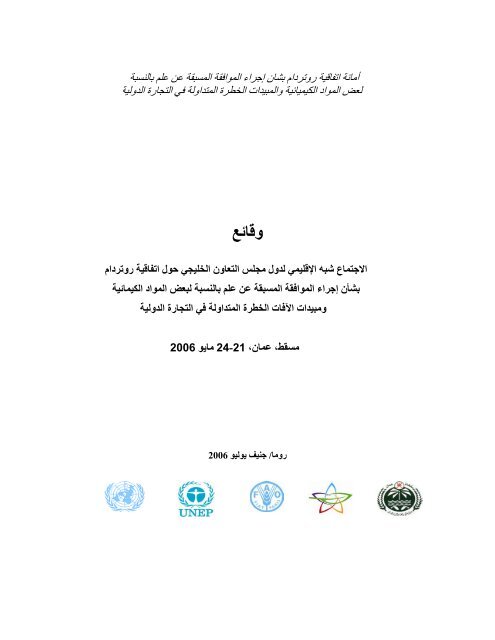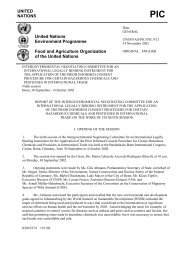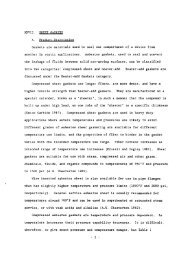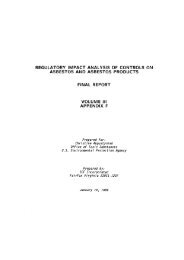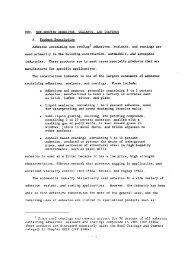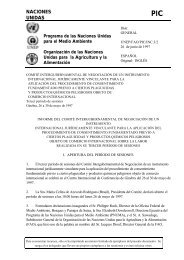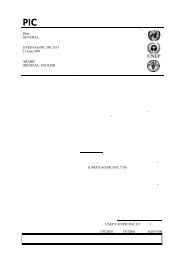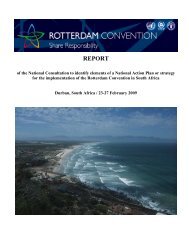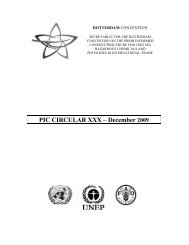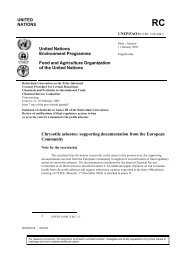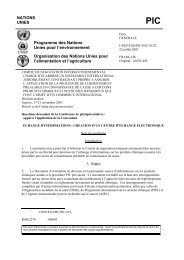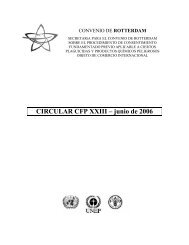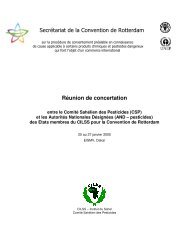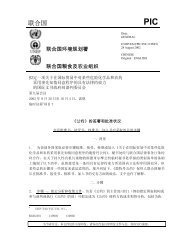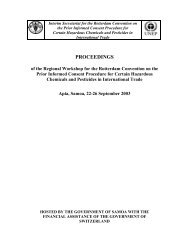وﻗﺎﺋﻊ - Rotterdam Convention
وﻗﺎﺋﻊ - Rotterdam Convention
وﻗﺎﺋﻊ - Rotterdam Convention
You also want an ePaper? Increase the reach of your titles
YUMPU automatically turns print PDFs into web optimized ePapers that Google loves.
أمانة اتفاقية روتردام بشان إجراء الموافقة المسبقة عن علم بالنسبة<br />
لعض المواد الكيميائية والمبيدات الخطرة المتداولة في التجارة الدولية<br />
وقائع<br />
الاجتماع شبه الإقليمي لدول مجلس التعاون الخليجي حول اتفاقية روتردام<br />
بشأن إجراء الموافقة المسبقة عن علم بالنسبة لبعض المواد الكيمائية<br />
ومبيدات الآفات الخطرة المتداولة في التجارة الدولية<br />
مسقط، عمان، 24-21 مايو 2006<br />
روما/ جنيف يوليو<br />
2006
Secretariat for the <strong>Rotterdam</strong> <strong>Convention</strong> on the<br />
Prior Informed Consent Procedure for Certain Hazardous<br />
Chemicals and Pesticides in International Trade<br />
Proceedings<br />
Sub Regional Meeting for the Gulf Council Countries (GCC)<br />
about the <strong>Rotterdam</strong> <strong>Convention</strong> on the Prior Informed<br />
Consent Procedure for Certain Hazardous Chemicals and<br />
Pesticides in International Trade,<br />
Muscat, Oman, 21-24 May 2006<br />
Rome\ Geneva July 2006
Table of content<br />
Summary 3<br />
Recommendations of the meeting (Arabic) 4<br />
Recommendations of the meeting (English) 5<br />
Agenda and timetable (Arabic) 6<br />
Agenda and timetable (English) 11<br />
List of participants 16<br />
Executive summary of Bahrain national implementation plan (Arabic) 22<br />
Executive summary of Bahrain national implementation plan (English) 24<br />
Elements of Bahrain national plan for ratification and implementation of the 26<br />
convention (Arabic)<br />
Elements of Bahrain national plan for ratification and<br />
28<br />
implementation of the convention (English)<br />
Executive summary of Kuwait national implementation plan (Arabic) 30<br />
Executive summary of Kuwait national implementation plan (English) 32<br />
Elements of Kuwait national plan for implementation of the convention<br />
34<br />
(Arabic)<br />
Elements of Kuwait national plan for implementation of the convention<br />
37<br />
(English)<br />
Executive summary Oman national implementation plan (Arabic) 40<br />
Executive summary of Oman national implementation plan (English) 41<br />
Elements of Oman national plan for implementation of the convention<br />
42<br />
(Arabic)<br />
Elements of Oman national plan for implementation of the convention<br />
45<br />
(English)<br />
Executive summary of Qatar national implementation plan (Arabic) 47<br />
Executive summary of Qatar national implementation plan (English) 48<br />
Elements of Qatar national plan for implementation of the convention<br />
49<br />
(Arabic)<br />
Elements of Qatar national plan for implementation of the convention<br />
51<br />
(English)
Summary<br />
Sub Regional Meeting for the Gulf Council Countries (GCC) about the<br />
<strong>Rotterdam</strong> <strong>Convention</strong> on the Prior Informed Consent Procedure for<br />
Certain Hazardous Chemicals and Pesticides in International Trade<br />
Muscat, Oman, 21-24 May 2006<br />
The consultation was held in Radisson SAS hotel, Muscat, Oman between 21 -24/5/2006.<br />
A total 28 participants from 4 countries attended the consultation; 3 participants from<br />
Bahrain, 4 participants from Kuwait, 11 participants from Oman, 5 participants from<br />
Qatar, one participant form the League of Arab States, one participant from the<br />
secretariat of <strong>Rotterdam</strong> convention (Rome), one participant from UNEP\ROWA, one<br />
participants from FAO\ RNE and one resource person ( ICRC expert).<br />
The opening session was held under the auspices of his Excellency Mr, M. Aloraimi the<br />
under secretary of regional municipalities, environment and water sources. The opening<br />
remarks were given by K. Almamari the director general of agriculture, on behalf of the<br />
host government (Oman), Dr. T. El Azzabi on behalf of FAO/NE, Gerold Wyrwal from<br />
the Secretariat of <strong>Rotterdam</strong> convention and Dr B. Al-Yousfi from the UNEP/ROWA.<br />
The consultation was structured into 8 sessions; 5 pure plenary and 3 including national<br />
break out groups. The language of the meeting was Arabic and all the presentations were<br />
delivered in Arabic as well. The following topics were covered by prepared presentations<br />
from the secretariat in plenary; Introduction to the convention, ratification process,<br />
operational elements and the possible approaches to implementation including the<br />
national approaches. The break out groups met three times; the first meeting was attended<br />
by the Bahraini participants only and was directed towards the identification of steps to<br />
ratification (challenges and how they can be addressed), in the second meeting the<br />
consultation was divided into four national break out groups to consider approaches to<br />
implementation of the key obligations of the convention and started filling the tables<br />
containing the elements of national plans, while in the third the four national break out<br />
groups reviewed the plans and drafted an executive summary to accompany the tables.<br />
The reports of the break out groups were presented and discussed in plenary and<br />
comments were included in the final report.<br />
The consultation was officially closed at 2 pm of the 25th of May /2006. K. Almamari on<br />
behalf of the host government, Taher El Azzabi on behalf of the FAO/RNE, Gerold<br />
Wyrwal on behalf of the secretariat of <strong>Rotterdam</strong> convention and M. Ali AL Baker on<br />
behalf of the participants gave the closing remarks.<br />
3
توصيات الاجتماع<br />
توفير دورات تدريبية لرجال الجمارك فيما يخص الاتفاقية.<br />
تدريب الكوادر الطبية والبيئية في مجال التعرف على حوادث التسمم بالمبيدات والمواد الكيماوية.<br />
إتباع الأساليب الحديثة في رصد الحوادث البيئية المتعلقة بالمبيدات والمواد الكيماوية.<br />
إقامة ورشة وطنية لتدريب أآبر عدد من الكوادر الوطنية في تنفيذ الالتزامات الرئيسية بموجب الاتفاقية.<br />
المشارآة الفعالة والمستمرة في الورش و الاجتماعات التي تعقد بخصوص هذه الاتفاقية.<br />
ترجمة الوثائق المتعلقة بالاتفاقية للغة العربية.<br />
طلب المساعدة التقنية والعلمية من الأمانة و الاستفادة منها.<br />
يرى وفد مملكة البحرين إيفاد أحد خبراء من أمانة الاتفاقية إلى المملكة لشرح و توضيح الاتفاقية و فوائدها و<br />
الالتزامات المترتبة عليها.<br />
إنشاء قاعدة معلومات عن المبيدات و الكيماويات في مملكة البحرين.<br />
إجراء فحص دوري آل ستة شهور على العاملين في مجال تداول و استخدام المبيدات وذلك لتحديد نسبة<br />
التعرض للمبيدات و متابعة الحالة الصحية للعاملين في هذا المجال.<br />
إجراء فحوصات دورية على الفواآه والخضراوات المستوردة وتحديد نسبة المبيدات المتبقية فيها.<br />
إنشاء مراآز تسمم و مراآز لرصد الحوادث البيئية في سلطنة عمان.<br />
•<br />
•<br />
•<br />
•<br />
•<br />
•<br />
•<br />
•<br />
•<br />
•<br />
•<br />
•<br />
4
Recommendations of the meeting<br />
• Training of custom officials about the convention;<br />
• Training the medical and environmental staff on the identification of poisoning<br />
by pesticides and other chemicals;<br />
• Follow the modern practices for monitoring the environmental incidence related<br />
to chemicals;<br />
• Conducting a national workshop to train large number of national staff on the<br />
implementation of key obligations of the convention<br />
• The continuous active participation in the workshops and meetings related to the<br />
convention;<br />
• Translation of all documents related to the convention into Arabic.<br />
• Requesting and making use of the technical and scientific assistance from the<br />
secretariat;<br />
• The Bahraini delegation believe that it is necessary to send an expert to the<br />
Kingdom of Bahrain to explain the convention, its benefits and subsequent<br />
obligations;<br />
• Build-up of a national data base for pesticides and other chemicals in the<br />
Kingdom of Bahrain;<br />
• Periodical inspection (every six months) of workers involved in handling and use<br />
of pesticides in order to estimate the level of exposure to pesticides and follow-up<br />
of their health conditions;<br />
• Periodical inspection of imported fruits and vegetables to estimate the level of<br />
pesticide residues in them.<br />
• Establishment of poison centers and centers for monitoring environmental<br />
incidents in Oman.<br />
5
الاجتماع شبه الإقليمي لدول مجلس التعاون الخليجي حول اتفاقية روتردام<br />
بشأن إجراء الموافقة المسبقة عن علم بالنسبة لبعض المواد الكيمائية<br />
ومبيدات الآفات الخطرة المتداولة في التجارة الدولية، مسقط، عمان، 24-21 مايو 2006<br />
اليوم الأول (الأحد)<br />
21 مايو 2006<br />
9:00-8:30<br />
الجلسة الأولى:<br />
تسجيل المشارآين<br />
الافتتاح<br />
الإفتتاح<br />
آلمة الدولة المضيفة<br />
آلمة منظمة الأغذية والزراعة<br />
آلمة برنامج الأمم المتحدة للبيئة<br />
آلمةالأمانة العامة لاتفاقية روتردام<br />
محمد العريمي-الرئيس<br />
خاتم المعمري<br />
طاهرالعزابي<br />
باسل اليوسفي<br />
ويرول جيرولد<br />
9:45-9:00<br />
إستراحة<br />
تقديم المشارآين والأمانة<br />
استعراض جدول الأعمال وتنظيم الورشة<br />
مأمون العلوي-الرئيس<br />
أزهري عبدالباقي<br />
*<br />
*<br />
الأهداف/ الترآيب<br />
ترتيبات الإجتماع<br />
الحسني / طاهرا لعزابي<br />
10:15-9:45<br />
10:30-10:15<br />
الجلسة الثانية:<br />
مقدمة عن اتفاقية روتردام<br />
استعراض لاتفاقية روتردام<br />
مأمون العلوي-الرئيس<br />
طاهرا لعزابي<br />
أزهري عبدالباقي<br />
أزهري عبدالباقي<br />
مامون العلوي-الرئيس<br />
أزهري عبدالباقي<br />
*<br />
*<br />
الفوائد<br />
الالتزامات<br />
* طريقة العمل<br />
*<br />
*<br />
*<br />
*<br />
*<br />
نهاية الفترة الإنتقالية<br />
موقف التنفيذ والانشطة الحالية<br />
مناقشة/أسئلة وإجابات<br />
الغداء<br />
التصديق على اتفاقية روتردام<br />
التوقيع والتصديق<br />
11:30-10:30<br />
12:00-11:30<br />
12:30-12:00<br />
13:00-12:30<br />
14:00-13:00<br />
الجلسة الثالثة:<br />
استعراض عام لخطوات التصديق والتحديات<br />
فوائد التصديق<br />
14:30-14:00<br />
6
تقديم بواسطة الدول المشارآة<br />
الدول من المجلس التي صدقت على الاتفاقية (عمان، قطر و الكويت)<br />
– وصف للطريقة التي اتبعت والخبرة في عملية التصديق<br />
استراحة<br />
ابراهيم ودادي (عمان)؛ عبداالله<br />
النعيمي (قطر)؛ عبدالرحمن الجميل<br />
(الكويت)<br />
15:30-14:30<br />
15:40-15:30<br />
جعفر سلمان<br />
أزهري عبدالباقي<br />
مشارآون من البحرين<br />
عبدالعزيز الخدري<br />
جعفر سلمان-الرئيس<br />
باسل اليوسفي<br />
باسل اليوسفي<br />
طاهر العزابي<br />
–<br />
16:00-15:40<br />
16:15-16:00<br />
16:30-16:15<br />
17:30-16:30<br />
10:00-9:00<br />
10:15-10:00<br />
الجلسة الرابعة<br />
الدول من المجلس التي لم تصدق بعد (البحرين)<br />
على الاتفاقية – تقرير مفصل عن الوضع الحقيقي الراهن بشأن<br />
التصديق، ماذا تم، بواسطة من وما هي التحديات<br />
مناقشة ندوية – الدروس التي لقنت، اعتبار الفوائد<br />
والتحديات والعقبات في التصديق<br />
أسئلة و إجابات<br />
التجهيز للمجموعات المنفصلة<br />
مجموعة منفصلة:<br />
التعرف على الخطوات نحو التصديق، تحديد المسئوليات؛<br />
التعرف على طرق مواجهة أي تحديات<br />
و إقتراح الخطوات القادمة التي يجب إتباعها للتصديق.<br />
اليوم الثاني (الاثنين)<br />
استعراض نتائج المجموعات المنفصلة عن الخطوات القادمة نحو<br />
التصديق<br />
استراحة<br />
الترآيز على الوسائل الوطنية (فرص التكامل مع الأنشطة القائمة<br />
في مجال ادارة الكيماويات)<br />
استعراض اتفاقيتي بازل واستوآهولم<br />
وأوجه التعاون مع اتفاقية روتردام.<br />
إدارج شئون اتفاقية روتردام ضمن البرامج<br />
الوطنية الأخرى لإدارة الكيماويات<br />
(النهج الاستراتيجي الدولي لإدارة المواد الكيميائية، (SAICM<br />
معلومات عن النظام الموحد لدول مجلس التعاون الخليجي بشان<br />
المبيدات<br />
الغداء<br />
مناقشة، أسئلة وإجابات<br />
12:00-10:15<br />
13:00-12:00<br />
7
الجلسة الخامسة:<br />
العناصر العملية لاتفاقية روتردام<br />
الالتزامات الخاصة لاتفاقية روتردام<br />
قرارات الاستيراد<br />
عرض عن عملية قرارات الاستيراد والوثائق الأساسية<br />
جعفر سلمان- الرئيس<br />
أزهري عبدالباقي<br />
طاهر العزابي<br />
ابراهيم ودادي<br />
ويرول جيرولد<br />
أزهري عبدالباقي<br />
أزهري عبدالباقي<br />
*<br />
*<br />
*<br />
*<br />
*<br />
*<br />
التزامات الأطراف<br />
اعتبار الإجراءات الوطنية المطلوبة<br />
دولة من الإقليم تستعرض خبرتها في عملية قرارات الاستيراد<br />
مناقشة – أسئلة وإجابات<br />
مقترحات مستحضرات مبيدات الافات شديدة الخطورة<br />
عرض عن عملية الإقتراح والوثائق الأساسية<br />
التزامات الأطراف<br />
اعتبار الإجراءات الوطنية المطلوبة<br />
مناقشة – أسئلة وإجابات؛<br />
الإخطار عن الإجراءات التنظيمية<br />
عرض عن عملية الإخطار والوثائق الأساسية<br />
إلتزامات الأطراف<br />
اعتبار الإجراءات الوطنية المطلوبة<br />
دولة من الإقليم تستعرض خبرتها في طريقة<br />
الإخطار والتحديات<br />
مناقشة – أسئلة وإجابات؛<br />
16:00-13:00<br />
تبادل المعلومات<br />
اسنعراض للمعلومات المتاحة عبر اتفاقية روتردام<br />
•<br />
•<br />
مناقشة – أسئلة وإجابات؛<br />
المعلومات المتاحة<br />
فرص تبادل المعلومات<br />
باسل اليوسفي<br />
الجلسة السادسة:<br />
اليوم الثالث (الثلاثاء)<br />
التعرف على طرق التنفيذ الممكنة<br />
مقدمة<br />
عبدالرحمن الجميل- الرئيس<br />
عامة – جلسة<br />
أزهري عبدالباقي<br />
9:15-9:00<br />
8
أهداف المجموعات المنفصلة- اعتبار طرق تنفيذ<br />
الالتزامات الأساسية، وملء الجداول.<br />
المجموعات المنفصلة<br />
المجموعات<br />
- التعرف<br />
على العمليات المطلوبة لاعداد وتقديم المعلومات والوثائق ذات الصلة<br />
(ردود الاستيراد، تقارير الحوادث، الإخطار عن الإجراءات التنظيمية<br />
النهائية) للأمانة<br />
و بناءً على المعلومات التي قدمت في العروض والوثائق التي<br />
جهزت بواسطة الأمانة،،<br />
تقوم المجموعات المنفصلة:<br />
بالتعرف على التحديات الأساسية وتعتبر الخطوات<br />
11:00-9:15<br />
القادمة الممكنة لتنفيذ آل العناصر الأساسية للاتفاقية وتقوم بملء<br />
الجداول عن آل من ردود الاستيراد، مقترحات مبيدات الآفات شديدة<br />
الخطورة والإخطار عن الإجراءات التنظيمية النهائية.<br />
استراحة (تحدد في الوقت المناسب بواسطة المجموعات المنفصلة)<br />
جلسة عامة<br />
تقدم المجموعات آل على حدا التحديات الأساسية التي<br />
تم التعرف عليها والطرق الممكنة لتنفيذ أي من الالتزامات<br />
الأساسية (عن آل من ردود الاستيراد، مقترحات<br />
مبيدات الآفات شديدة الخطورة والإخطار عن الإجراءات<br />
التنظيمية النهائية).<br />
تستعرض الجلسةالعامة المعلومات التي قدمت<br />
وتتبادل الأراء وتناقش الحلول الممكنة.<br />
الغداء<br />
عبدالرحمن الجميل- الرئيس<br />
مأمون العلوي<br />
النعيمي (قطر<br />
(الكويت)<br />
(عمان)؛ عبداالله<br />
)؛ ماهر الهنيدي<br />
10:15-10:00<br />
12:00-11:00<br />
13:00-12:00<br />
9
الجلسة السابعة<br />
مراجعة عناصر الخطط الوطنية والخطوات التالية<br />
المجموعات المنفصلة (حسب الوطن) تراجع<br />
الخطط الوطنية أو الاستراتيجيات.<br />
•<br />
•<br />
إعداد جدول نهائي منقح يحتوي على عناصر<br />
إجراءات الخطط الوطنية أو الاستراتيجيات<br />
لأجل التصديق على وتنفيذ اتفاقية روتردام<br />
وتعديله بعد المناقشة في الجلسة العامة.<br />
إعداد ملخص وصفي تنفيذي يصاحب قائمة<br />
عناصر إجراءات الخطط الوطنية.<br />
اليوم الرابع (الاربعاء)<br />
17:00-13:00<br />
الجلسة الثامنة<br />
استعراض إجراءات الخطط الوطنية أو الاستراتيجيات<br />
- جلسة مقدمة<br />
جلسة عامة<br />
عامة<br />
استعراض الملخص التنفيذي مع القائمة المنقحة للقضايا الوطنية،<br />
الإجراءات التي يجب اتخاذها (بواسطة من ومتى) و استعراض<br />
الخطط الوطنية أو الاستراتيجيات بشأن التصديق على و تنفيذ اتفاقية<br />
روتردام.<br />
استعراض الملخص التنفيذي المرفق<br />
•<br />
•<br />
•<br />
•<br />
•<br />
مراجعة قائمة ووصف الخطط الوطنية.<br />
تعقيب ختامي- الدولة المضيفة<br />
تعقيب ختامي- منظمة الأغذية والزراعة<br />
تعقيب ختامي- أمانة اتفاقية روتردام<br />
تعقيب ختامي- عن المشارآين<br />
عبدالرحمن الجميل- الرئيس<br />
المجموعات<br />
منى الباآر و خولة البحر(قطر)-<br />
الرئيس<br />
جعفر أحمد سلمان-البحرين<br />
ماهر الهنيدي-الكويت<br />
ابراهيم ودوادي-عمان<br />
عبداالله النعيمي-قطر<br />
الجلسة العامة<br />
خاتم المعمري (عمان)<br />
د.طاهر العزابي<br />
جيرولد ويرول<br />
منى الباآر<br />
9:15-9:00<br />
13:00-9:15<br />
10
Sub Regional meeting for the Gulf Council Countries (GCC) on the <strong>Rotterdam</strong> <strong>Convention</strong> On the Prior Informed<br />
Consent Procedure for Certain Hazardous Chemicals and Pesticides in International Trade,<br />
Muscat, Oman, 21-24 May 2006<br />
First Day (Sunday) 21May 2006<br />
8:30-9:00 Registration of participants<br />
1 st Session: OPENING M.<br />
Aloraimi-<br />
Chair<br />
9:00-9:45 Opening<br />
Opening Remarks – Host Government<br />
Opening Remarks – on behalf of FAO<br />
Opening Remarks – on behalf of UNEP<br />
Opening Remarks – Secretariat of the <strong>Rotterdam</strong> <strong>Convention</strong><br />
K. Almamari<br />
T. El Azzabi<br />
B. Al-Yousfi<br />
G. Wyrwal<br />
9:45-10:15 Break<br />
10:15-10:30 Presentation of participants and secretariat Mamoon<br />
AL-ALAWI<br />
Chair<br />
Overview of the agenda and organization of the workshop<br />
• Objectives/ Structure A. Abdelbagi<br />
Local arrangements<br />
T. El Azzabi<br />
H. AlHasni<br />
2 nd Session Introduction to the <strong>Rotterdam</strong> <strong>Convention</strong> Mamoon<br />
AL-ALAWI<br />
Chair<br />
10:30-11:30 General overview/Background of the <strong>Rotterdam</strong> <strong>Convention</strong> T. ElAzzabi<br />
• Benefits<br />
• Obligations<br />
• Operational procedures<br />
A.<br />
Abdelbagi<br />
11
11:30-12:00<br />
12:00-12:30<br />
• End of transition period<br />
• Status of implementation and current activities.<br />
A.<br />
Abdelbagi<br />
12:30-13:00 Discussion / questions and answers<br />
13:0014:00 Lunch<br />
3 rd Session Ratification of the <strong>Rotterdam</strong> <strong>Convention</strong> Mamoon<br />
AL-ALAWI<br />
Chair<br />
14:00-14:30 Signature and Ratification<br />
A. Abdelbagi<br />
• General overview on steps for ratification and challenges<br />
• Benefits of ratification<br />
14:30-15:30 Presentations by invited countries:<br />
15:30-15:40 Break<br />
• Countries in the GCC who have ratified the <strong>Convention</strong> (Oman, Qatar, Kuwait,) -<br />
description of the process followed, experience with the ratification process;<br />
15:40-16:00 • Countries in the GCC who has not yet ratified the <strong>Convention</strong> (Bahrain ) –<br />
detailed report on exact status quo with ratification, what has been done and by<br />
Ibrahim WAD<br />
WADI (Oman)<br />
Abdullah AL-<br />
NAIMI<br />
(Qatar) & Abdel<br />
Rahman AL-<br />
Jameel (Kuwait)<br />
Jaffar SALMAN<br />
(Bahrain)<br />
whom, what challenges met;<br />
16:00-16:15 Panel discussion – lessons learned, consideration of benefits as well as challenges and<br />
obstacles to ratification, Questions and answers;<br />
16:15-16:30 Preparation for breakout groups A.<br />
Abdelbagi<br />
16:30-17:30 Break out group): identify steps towards ratification, assign responsibilities; identify<br />
means to address any challenges and propose next steps to be taken for ratification<br />
Participants from<br />
Bahrain<br />
12
Second Day<br />
9:00h –<br />
10:00h<br />
Presentation of the results of the break out groups on “Next steps towards<br />
ratification”<br />
Abdul Azeez A.<br />
AL-KHIDRI<br />
(Bahrain)<br />
10:00-10:15 Break<br />
4 th Session Focusing on national approaches (Opportunities for integration with ongoing<br />
chemical management activities)<br />
10:15-12:00 Overview of the Basel and Stockholm <strong>Convention</strong>, and Synergies with the <strong>Rotterdam</strong><br />
Jaffar<br />
SALMAN<br />
Chair<br />
B. Al-Yousfi<br />
<strong>Convention</strong><br />
Incorporating issues of the <strong>Rotterdam</strong> <strong>Convention</strong> in other national chemicals<br />
management programmes (SAICM)<br />
Information about the harmonized system for registration of pesticides on the GCC<br />
B. Al-Yousfi<br />
T. El Azzabi<br />
; Discussion – Questions and answers<br />
12:00-13:00 Lunch<br />
5 th Session Overview Operational elements of the <strong>Rotterdam</strong> <strong>Convention</strong> Jaffar<br />
SALMAN<br />
Chair<br />
13:00-16:00 Specific Obligations of the <strong>Rotterdam</strong> <strong>Convention</strong> (Session to include a coffee<br />
break at an appropriate time)<br />
Import decisions:<br />
Presentation of the process for import decisions and key documents<br />
• obligations of Parties<br />
consideration of national action required<br />
Country in the region presenting experience with the import response process and<br />
challenges;<br />
Discussion – Questions and answers;<br />
Proposals for severely hazardous pesticide formulations<br />
Presentation of the proposal process and key documents<br />
• obligations of Parties<br />
consideration of national action required<br />
Discussion – Questions and answers;<br />
Notifications of regulatory control actions<br />
Presentation of the notification process and key documents<br />
• obligations of Parties<br />
• consideration of national action required<br />
A. Abdelbagi<br />
El Azzabi<br />
Ibrahim<br />
WAD WADI<br />
(Oman)<br />
G. Wyrwal<br />
A. Abdelbagi<br />
13
Country in the region presenting experience with the notification process and<br />
challenges;<br />
A. Abdelbagi<br />
Discussion – Questions and answers;<br />
Information exchange<br />
Presentation of the information available under the <strong>Rotterdam</strong> <strong>Convention</strong><br />
• information available<br />
• opportunities for information exchange<br />
B. Al-Yousfi<br />
; Discussion – Questions and answers<br />
Third Day<br />
6 th Session Identification of possible approaches to implementation Abdel<br />
Rahman AL-<br />
Jameel<br />
(Chair)<br />
9:00-9:15 Introduction – Plenary A. Abdelbagi<br />
• Objectives of the breakout groups – to consider approaches to implementation of<br />
the key obligations and completing the tables<br />
9:15-11:00 Breakout groups – Identification of processes required to prepare and submit relevant<br />
information and documentation (import responses, incident report forms and<br />
notification of final regulatory action) to the secretariat.<br />
Based information provided in presentations, and documentation prepared by the<br />
Secretariat, the working groups will:<br />
• identify key challenges and consider possible next steps to the implementation of<br />
all key operational elements of the <strong>Convention</strong> and complete the tables about<br />
import responses, severely hazardous pesticide formulations and notification of<br />
final regulatory actions<br />
Groups<br />
10:00-10:15 Break (as appropriate during breakout group)<br />
11:00-12:00 Plenary Session Abdel Rahman AL-<br />
Jameel Chair<br />
• Groups to present individually the key challenges identified, and the possible<br />
approaches to implement each of the key obligations (about import responses,<br />
severely hazardous pesticide formulations and notification of final regulatory<br />
actions)<br />
• Plenary to consider the approaches presented, exchange views, and discuss<br />
possible solutions<br />
I. WAD WADI<br />
(Oman)<br />
A. AL-NAIMI<br />
(Qatar) & M.<br />
AL-<br />
HUNAIDI<br />
(Kuwait)<br />
12:00-<br />
Lunch<br />
13:00<br />
7 th Session Review elements of National Action Plans and next steps Abdel Rahman AL-<br />
Jameel)Chair<br />
13:00-17:00 Breakout groups (national lines) – Review the national action plans or strategies Groups<br />
14
• Finalize the prepared consolidated tables containing the elements of a national action<br />
plan or strategy for the ratification and implementation of the <strong>Rotterdam</strong> <strong>Convention</strong>,<br />
and make any amendments following plenary discussions;<br />
• Formulate a descriptive Executive Summary to accompany the list of elements of a<br />
national action plan;<br />
Fourth Day<br />
8 th Session Presentation of National Action Plans and Strategies M. Ali AL<br />
BAKER & K.<br />
AL BAHR<br />
Chair<br />
9:00-9:15 Introduction – Plenary<br />
9:15-13:00 Plenary Session<br />
• Presentation of the executive summary, along with table of consolidated lists of<br />
national issues, actions to be taken (by whom, when) and presentation of the<br />
national plans or strategies regarding implementation of the <strong>Rotterdam</strong><br />
<strong>Convention</strong><br />
Presentation of the accompanying executive summary<br />
• Review of list and description of national plans<br />
• Closing remarks, host country<br />
• Closing remarks, FAO<br />
• Closing remarks, Secretariat of the <strong>Rotterdam</strong> <strong>Convention</strong><br />
• Closing remarks, on behalf of participants<br />
J. SALMAN<br />
(Bahrain), M. AL-<br />
HUNAIDI<br />
(Kuwait), I. WAD<br />
WADI (Oman)&<br />
A. AL-NAIMI<br />
(Qatar)<br />
Plenary<br />
K. Almamari T. El<br />
Azzabi<br />
G. Wyrwal<br />
M. Ali AL Baker<br />
15
List of Participants<br />
BAHRAIN<br />
Abdul Azeez A. AL-KHIDRI<br />
Entomologist<br />
Environmental Health Section<br />
Public Health Directorate<br />
Manama<br />
Tel:00973 17641014<br />
E-mail:aziz-7801@hotmail.com<br />
Jaffar Ahmad SALMAN<br />
Senior Environmental Specialist<br />
Head of Chemical Safety Unit<br />
Environmental Control Directorate<br />
Manama<br />
Tel:00973 17875168<br />
Fax:00973 17786102<br />
E-mail:ozoneea@batelco.com.bh<br />
Reda Ebrahim ISA<br />
Environmental Inspector<br />
Chemicals Safety Unit<br />
Manama<br />
Tel:00973 39849481<br />
Fax:00973 17786102<br />
E-mail:redaebrahim@hotmail.com<br />
KUWAIT<br />
Ghanim Saqer AL-GHANIM<br />
Director, Legal Department<br />
Ministry of Foreign Affairs<br />
Tel: 009652430685 - EXT:1375<br />
Fax: 009652432839<br />
E-mail: private777955@hotmail.com<br />
Maher AL-HUNAIDI<br />
Public Authority of Agriculture & Fish Resources<br />
Tel: 009654723892<br />
Fax: 009654723893<br />
E-mail:Alhunaidim4@Hotmail.com<br />
16
Abdel Rahman AL-Jameel<br />
Chemistry Dept.<br />
Environment Public Authority<br />
Tel:00965 4821284<br />
Fax:00965 4821284<br />
E-mail: aaljameel@hotmail.com<br />
Emad. J. AlMassad<br />
Custom General Administration<br />
Tel. 00965 4812979/4816037<br />
Fax .00965 4839267<br />
OMAN<br />
Mamoon Bin Khamis AL-ALAWI<br />
Head of Locust Control Unit<br />
Ministry of Agriculture and Fisheries<br />
Muscat<br />
Tel:00968 24 540648<br />
Fax:00968 24 540620<br />
E-mail: dlumaf@omantel.net.om<br />
Fatma Bint Suleiman AL-ABRI<br />
Toxicologist at Plant Protection Research Centre<br />
Ministry of Agriculture and Fisheries<br />
Muscat<br />
Tel:26 893 717<br />
Fax:26 893 097<br />
E-mail: research@omantel.net.om<br />
Ibrahim Bin Hamad WAD WADI<br />
Environmental Inspector<br />
Ministry of Regional Municipalities and Environment & Water Resources<br />
Muscat<br />
Tel:+96824692550<br />
Fax: +96824692462<br />
E-mail:wadwadi888@yahoo.com<br />
Khalifa Bin Salem AL-GHASIYNI<br />
Sanitary Supervisor<br />
Ministry of Health<br />
Muscat<br />
Tel:+968 99417513<br />
Fax: +968 24563121<br />
17
Abdullah Bin Hassan Al- Balushi<br />
Directorate General of Customs<br />
Royal Oman Police<br />
Muscat<br />
Tel: 00968-24 510139<br />
Fax: 00968-24 510488<br />
Mobile Phone : 00968 99335577<br />
Fahad Mohmood Himed Al- Balushi<br />
Senior Lab. Tech. (Toxicology Research Lab) Agricultural Research Center , Ministry of<br />
Agriculture and Fisheries<br />
Tel. 00968 26893917<br />
Fax:00968 26893097<br />
E-mail: fm2005@omantel.net.om<br />
Maria Mansour Al- Balushi<br />
Agricultural Engineer<br />
Ministry of Agriculture<br />
Tel. 00 968 24696282<br />
Fax. 00968 24692069<br />
E.mail : mhsam98@yahoo.com<br />
Sheikha Al Harthi<br />
Directorate of Agriculture<br />
Plant protection specialist<br />
Tel. 00968-24696287<br />
Fax. 00968-24692069<br />
mam-595@yahoo.com<br />
Hamoud Darwish Al Hasani<br />
Director , Plant Protection Research center<br />
Ministry of Agriculture and Fisheries<br />
Tel:00968-26893560<br />
E.mail alhasanihds@yahoo<br />
Sulaiman Al-Toubi<br />
Director of Plant Protection Department<br />
Ministry of Agriculture and Fisheries<br />
Tel: 00968-24696287<br />
Fax: 00968-24692069<br />
E.mail : altoubi68@hotmail.com<br />
18
Saif Hamaid Saif Al-Habsi<br />
Ministry of Agriculture and Fisheries<br />
Muscat<br />
Tel: 00968-25570199<br />
Fax: 00968-26893097<br />
Mobil: 00968-99338375<br />
QATAR<br />
Mohamed Jassim ALMOHANNADI<br />
Agricultural Development Section<br />
Ministry of Municipal Affairs and Agriculture (Doha)<br />
Tel: 00964-4671262<br />
Fax: 00964-4676148<br />
E-mail:almehri73@hotmail.com<br />
Mona Ali AL BAKER<br />
Ministry of Municipal Affairs and Agriculture (Doha)<br />
Tel: + 974 4414755<br />
Fax: +974 416266<br />
E-mail:Monati69@yahoo.com<br />
Khawla Abdallah Yousef AL BAHR<br />
Ministry of Municipal Affairs and Agriculture (Doha)<br />
Tel:+974 4389530<br />
Fax: +974 416266<br />
Email:amkhaled@hotmail.com<br />
Abdullah Hamad AL-NAIMI<br />
Senior Chemist<br />
Supreme Council for the Environment and Natural Reserves<br />
P.O. Box 7634 Doha<br />
Tel: 00974-4437171 – EXT: 456<br />
Fax: 4415246<br />
E-mail: ahnaemi@qatarenv.org.qa<br />
Mohamed Shaheen R A Al Dosari<br />
Customs and Ports General Authority<br />
Adminis. and Finance Affairs Dept.<br />
Doha<br />
Tel:+974 4621238<br />
Fax:+974 5878790<br />
E-mail:boshahen@hotmail.com<br />
19
UNEP/ROWA<br />
A. Basel. AL-YOUSFI<br />
Regional Industry Officer UNEP/ROWA<br />
P.O. Box: 10880<br />
Manama, Bahrain<br />
Tel.: (+973) 17812777<br />
Direct: (+973) 17812780<br />
Fax: (+973) 17825110/(+973) 17825111<br />
E-mail: Basel.Alyousfi@unep.org.bh<br />
Resource Person<br />
Azhari Omer ABDELBAGI<br />
Director, Training Directorate<br />
Ministry of Higher Education and Scientific Research<br />
Sudan<br />
Tel: +249-183781263 (office)<br />
Home: +249-185-360323<br />
Fax: + 249-183-781 267<br />
E-mail: azharibagi@yahoo.com<br />
<strong>Rotterdam</strong> <strong>Convention</strong> Secretariat<br />
Gerold WYRWAL<br />
Agricultural Officer,<br />
Secretariat of the <strong>Rotterdam</strong> <strong>Convention</strong>, AGPP,<br />
Food and Agriculture Organization of the United Nations (FAO)<br />
Viale delle Terme di Caracalla<br />
00100 Rome, Italy<br />
Tel: (+39 06) 5705 2753<br />
Fax: (+39 o6) 5705 3224<br />
E-mail: gerold.wyrwal@fao.org<br />
20
FAO/RNE<br />
Taher EL AZZABI<br />
Senior Plant Production Officer<br />
FAO Regional Office for the Near East<br />
P.O. Box 2223, Cairo, Egypt<br />
Tel: ++202-3316000 (Ext. 2809)<br />
Fax: ++202-7495981<br />
Email: taher.elazzabi@fao.org<br />
LAS<br />
Mohamed Sabet Afifi<br />
Specialist, LAS<br />
Tel: 002025750511<br />
Fax: 002025779546<br />
E-mail: envsusdev.dept@las.int<br />
21
الملخص التنفيذي للخطة الوطنية للبحرين بشأن التصديق على وتنفيذ اتفاقية روتردام<br />
1 لسنة<br />
7<br />
1996 الإطار العام لحماية البيئة في مملكة البحرين آما تعتبر القرارات الوزارية<br />
يمثِل قانون البيئة رقم من ضمن القرارات الوزارية المتعلقة بإدارة المواد الكيميائية و التحكم فيها، القرار الوزاري رقم<br />
الآلية التنفيذية له. الذي يتعلق بمنع استيراد مادة الأسبستوس و منتجاتها وآذلك قرار حظر و تقييد بعض المواد<br />
لسنة أيضا تم إعداد مسودة قرار وزاري بشأن إدارة المواد الكيميائية الخطرة. إضافة إلى تلك التشريعات يوجد<br />
الكيميائية. قرار وزاري بشأن استيراد و استخدام مبيدات الآفات صادر عن وزارة البلديات و الزراعة و قانون الصحة العامة<br />
2002<br />
رقم 3 لسنة 1975 تعديل 1978.<br />
هذه التشريعات ستساعد في تنفيذ اتفاقية روتردام إلى حد ما، و لكن لابد من إيجاد تشريع إضافي يسند تنفيذ الاتفاقية<br />
بصورة تامة ليكون الالتزام بالاتفاقية في الداخل التزاماً قانونيا من آافة الأطراف المعنية.<br />
لا يوجد تشريع محدد لإدارة الكيماويات الصناعية في مملكة البحرين و لكن حددت القرارات الوزارية الكثير من<br />
المواد المحظورة و المقيدة بشدة بغض النظر عن استخداماتها. يتم الترخيص لاستيراد و استخدام المواد الكيميائية من<br />
قبل الهيئة العامة لحماية الثروة البحرية و البيئة و الحياة الفطرية بعد دراستها فنياً (الاستخدام والتداول، التخزين...<br />
الخ) و مقارنة هذه المواد بالمواد المحظورة و المقيدة بشدة.<br />
وبما أن المواد الخاضعة لاتفاقية استوآهولم قد اعتبرت من المواد المحظور استيرادها إلى مملكة البحرين طبقا<br />
للقرار الوزاري رقم 7 لسنة 2002، فانه يتوجب على آل من يعتزم استيراد أي من تلك المواد أن يبلغ الهيئة العامة<br />
لحماية الثروة البحرية و البيئة و الحياة الفطرية و التي بدورها سترفض السماح باستيرادها، و هذا الإجراء حتما<br />
سيعزز ما يتطلبه تنفيذ اتفاقية روتردام بشان الموافقة المسبقة عن علم.<br />
من الصعب اقتراح فترة زمنية للانضمام إلى اتفاقية روتردام و ذلك بسبب أن هذه الاتفاقية سيتم إعادة دراستها من<br />
جديد فنياً من قبل الهيئة العامة لحماية الثروة البحرية و البيئة و الحياة الفطرية و التي سوف تقوم باستشارة الجهات<br />
المعنية ومن ثم ترفع توصيتها للإدارة العامة للشؤون القانونية لدراستها من ناحية عدم معارضتها مع القوانين المحلية<br />
و الاتفاقيات الدولية الأخرى بالإضافة إلى احتساب مساهمة مملكة البحرين في هذه الاتفاقية. عند موافقة الشؤون<br />
القانونية ترفع توصية لمجلس الوزراء الذي سيصدر أمر لدراستها من قبل مجلسي النواب و الشورى تمهيداً لرفعها<br />
لديوان جلالة الملك لإصدار مرسوم ملكي بالانضمام إلى الاتفاقية. يحوّل هذا المرسوم بعد ذلك إلى وزارة الخارجية<br />
التي ستصدر تعليماتها إلى المندوب الدائم في الأمم المتحدة لإيداع صك الانضمام.<br />
اقترح الوفد تكوين لجنة وطنية تترأسها السلطة الوطنية المعينة و مكونة من الجهات المعنية (البيئة، الصحة،<br />
الزراعة، الجمارك، الدفاع المدني، غرفة تجارة و صناعة البحرين... إلخ). مهمة هذه اللجنة مراقبة استيراد و<br />
استخدام المواد الكيميائية و مبيدات الآفات. يشكل هذا مزيدا من التنسيق و التعاون وتبادل المعلومات في ما يتعلق<br />
بالتحكم في تلك المواد من اجل سلامة الإنسان و بيئته.<br />
قبل اتخاذ أي إجراء بشأن التصديق على الاتفاقية لابد من إعداد مسودة مذآرة إلى الجهات المعنية تبين فيها فوائد هذه<br />
الاتفاقية، التزاماتها و التحديات المترتبة عليها، إضافة إلى مشارآة البحرين في اجتماعات مناقشة النص النهائي<br />
للاتفاقية. آذلك سيتم توضيح حقيقة أن مملكة البحرين قد صدقت ووقعت على الاتفاقيات البيئية الأخرى (مثل بازل،<br />
فيينا، استوآهولم...الخ). آذلك سيتم توضيح حقيقة أن جميع دول مجلس التعاون الخليجي قد صدقت على الاتفاقية عدا<br />
مملكة البحرين.<br />
2006) بإعداد مسودة لتوضيح<br />
سوف يقوم الفريق المشارك في ورشة العمل هذه (مسقط، عمان<br />
فوائد التصديق على الاتفاقية إلى الجهات العليا المسئولة لدراستها و إبداء الرأي فيها.<br />
بعد إيداع صك التصديق على الاتفاقية ستبدأ عملية التنفيذ من خلال إعداد و تقديم ردود الاستيراد للكيماويات<br />
المدرجة في المرفق الثالث، وآذلك إعداد و تقديم إخطارات عن الإجراءات التنظيمية بشأن الكيماويات المحظورة و<br />
المقيدة بشدة، آما سيتم إرسال تقارير عن حوادث التسمم بمستحضرات مبيدات الآفات شديدة الخطورة، ووضع آلية<br />
لاستلام و إرسال إخطارات التصدير في حينها.<br />
عند تصديق مملكة البحرين على الاتفاقية ستسعى للمشارآة آطرف في مؤتمر الأطراف بعد نفاذ التسعين يوماً و إلا<br />
ستكون لها فرصة الحضور آمراقب في هذا المؤتمر.<br />
المقترحات:<br />
24 - 21 مايو<br />
22
يرى وفد مملكة البحرين إيفاد احد الخبراء من الأمانة إلى مملكة البحرين لشرح و توضيح الاتفاقية و<br />
فوائدها و الالتزامات المترتبة عليها.<br />
إنشاء قاعدة معلومات عن المبيدات و الكيماويات الأخرى.<br />
إجراء فحص دوري (آل ستة أشهر) على العاملين في مجال تداول و استخدام المبيدات وذلك لتحديد نسب<br />
التعرض للمبيدات و متابعة الحالة الصحية للعاملين في هذا المجال.<br />
تدريب سلطات الجمارك على آيفية التعامل مع الواردات من المواد الكيميائية الخطرة و المبيدات و على<br />
آيفية منع المواد الخطرة المحظور دخولها لمملكة البحرين.<br />
المشارآة بصورة مستمرة في مؤتمر الأطراف وورش العمل ذات الصلة بالاتفاقية.<br />
إجراء فحوصات دورية على الفواآه و الخضراوات المستوردة لتحديد نسبة المبيدات المتبقية فيها.<br />
-1<br />
-2<br />
-3<br />
-4<br />
-5<br />
-6<br />
23
Executive summary of Bahrain national plan for ratification and implementation of<br />
<strong>Rotterdam</strong> convention<br />
The environment law No 1 for the year 1996 represents the general frame-work for<br />
environmental protection in the Kingdom of Bahrain and the ministerial decisions<br />
represent its executive mechanisms. Among ministerial decisions about management and<br />
control of chemicals, the ministerial decision No 7 for the year 2002 regarding the<br />
banning of asbestos and asbestos products as well as other decisions concerning banning<br />
or restriction of other chemicals. A ministerial decision concerning the management of<br />
dangerous materials was prepared. Beside these legislation there is a ministerial decision<br />
concerning the import and use of pesticides issued by the ministry of municipalities and<br />
agriculture in addition to the general health law No 3 for the year 1975 amendments of<br />
1978.<br />
All these legislations may support the implementation of <strong>Rotterdam</strong> convention to some<br />
extent, but there is a need for additional legislation for complete implementation of the<br />
convention so that it become legally binding for all internal relevant stake holders.<br />
There is no legislation concerning industrial chemicals, but the ministerial decisions had<br />
specified many of the banned and severely restricted chemicals irrespective of their use.<br />
The license for import and use of chemicals is issued by the General Corporation for<br />
Protection of Marine Resources, Environment and Natural Life after technical studies<br />
(handling, use, storage ...etc) and comparing that with other banned and severely<br />
restricted chemicals.<br />
Since all chemicals subject to Stockholm convention were banned in Bahrain according<br />
to the ministerial decision No 7 for the year 2002, therefore all those who wish to import<br />
such chemicals should submit an application to the General Corporation for Protection of<br />
Marine Resources, Environment and Natural Life which will subsequently refuse the<br />
request. Of course this action will consolidate the requirements for the implementation of<br />
the <strong>Rotterdam</strong> convention on the prior informed consent procedure.<br />
It is difficult to suggest time frame for the ratification process as this convention will be<br />
technically re-evaluated by the General Corporation for Protection of Marine Resources,<br />
Environment and Natural Life which will consult relevant concerned departments and<br />
then submit its recommendations to the Legislative Affairs Department of the council of<br />
ministers to study the convention from the point of view of its alignment with the<br />
national laws and other international conventions as well as the Bahraini financial<br />
contribution. After the consent of the Legislative Affairs Department, a recommendation<br />
will be submitted to the Council of Ministers who intern issue an order for its study by<br />
the Parliament and the Consultative Council as pre-request for its submission to the<br />
Divan of the Royal Majesty who will then issue a royal decree for the accession to this<br />
convention. The royal decree will be passed to the ministry of Foreign Affairs who will<br />
designate its Permanent Mission to the United Nations in New York to deposit the<br />
instrument of accession.<br />
The Bahraini delegation propose formation of a national committee headed by the<br />
Designated National Authority (DNA) and composed from other concerned bodies<br />
(environment, health, agriculture, custom, civil defense, Bahraini trade and industry<br />
chamber ...etc). The purpose of this committee is to observe the import and use of<br />
chemicals and pesticides. This will provide more coordination, cooperation and<br />
24
information exchange relevant to the control of these materials for the sake of human and<br />
the environmental safety.<br />
Before taking any decision regarding the ratification of this convention, a draft<br />
memorandum, explaining the benefit of this convention, its obligations and challenges in<br />
addition to the participation of Bahrain in the negotiations of the final text of the<br />
convention, has to be prepared and submitted to concerned departments. The fact that<br />
Bahrain had already signed and ratified all other environmental agreements (such as<br />
Basle, Stockholm, Vienna …etc) will also be explained. Also the fact that all Gulf<br />
Council Countries had ratified this convention will also be highlighted.<br />
The Bahrain delegation participating in this workshop (Muscat, Oman 21-24/5/2006)<br />
will prepare and submit a memorandum, explaining the benefits of this convention, to<br />
the higher responsible departments asking them to study it and give their opinion.<br />
After the deposition of the ratification, the implementation starts by preparation and<br />
submission of import responses for annex three chemicals, preparation and submission of<br />
notification about final regulatory actions of banned and severely restricted chemicals,<br />
submission of incident report forms for poisoning by severely hazardous pesticide<br />
formulations in addition to a mechanism for receiving and submission of export<br />
notification in time.<br />
After ratification, Bahrain will attend the conference of parties as a full party after ninety<br />
days; otherwise it will attend as observer.<br />
Suggestions;<br />
1. The Bahrain delegation believe that it is necessary to send an expert from the<br />
secretariat to the Kingdom of Bahrain to explain the convention, its benefits and<br />
subsequent obligations;<br />
2. Establishment of a national data base for pesticides and other chemicals;<br />
3. Periodical inspection (every six months) for workers involved in handling and<br />
use of pesticides in order to estimate the level of exposure to pesticides and<br />
follow-up their health conditions;<br />
4. Training of custom officials about handling of imported dangerous chemicals and<br />
pesticides and how to prevent the import of banned chemicals;<br />
5. Continuous participation in the conference of parties and workshops relevant to<br />
the convention;<br />
6. Periodical inspection of imported fruits and vegetables to estimate the level of<br />
pesticide residues in them.<br />
25
1- قد<br />
-1<br />
-2<br />
.1<br />
.2<br />
.3<br />
.4<br />
.5<br />
-<br />
-<br />
-<br />
-<br />
عناصر الخطة الوطنية للبحرين بشأن التصديق على وتنفيذ اتفاقية روتردام<br />
جلسة النقاش الأولى- فهم الفوائد من اتفاقية روتردام وعملية التصديق.<br />
الهدف: ضع في الاعتبار فوائد اتفاقية روتردام للبحرين وآيف تتكامل مع إستراتيجية/عملية التنمية في الدولة في مجال إدارة الكيماويات؛ تعرف على القضايا والتحديات<br />
وآيف تتم معالجتها.<br />
فوائد التصديق على اتفاقية روتردام هي:<br />
ستشكل حماية للدولة من دخول المواد الخطرة إضافة إلى تبادل المعلومات مع الدول الأعضاء.<br />
المشارآة في مؤتمر الأطراف و ما يترتب عليه من مشارآة في اتخاذ القرارات.<br />
الخطوات الواجب اتخاذها للتصديق:<br />
رفع توصية من الهيئة العامة لحماية الثروة البحرية و البيئة و الحياة الفطرية إلى إدارة الشؤون القانونية بمجلس الوزراء و التي سترفع المشروع مرة أخرى إلي<br />
مجلس الوزراء ومن ثم إلى مجلسي النواب والشورى للمناقشة. عقب ذلك يرفع لجلالة الملك/ سمو رئيس مجلس الوزراء ثم إلي وزارة الخارجية لتوجه مندوبها<br />
الدائم بالأمم المتحدة بإيداع الصك.<br />
عملية القرار في آل خطوة:<br />
تقوم الهيئة بدراسة الاتفاقية فنياً وترفع توصية بذلك.<br />
الشؤون القانونية بمجلس الوزراء تقوم بدراستها من ناحية الأعباء المالية و عدم تعارضها مع الاتفاقيات الأخرى الموقعة و القوانين الوطنية.<br />
تناقش الاتفاقية بحضور مسئولين من الهيئة و أعضاء مجلس النواب ثم تعرض على مجلس الشورى.<br />
ترفع إلى جلالة الملك لإصدار مرسوم ملكي بالانضمام.<br />
يحول المرسوم إلى وزارة الخارجية لإيداع الصك من خلال مندوبها الدائم بالأمم المتحدة.<br />
ما هي التحديات:<br />
تأخذ عملية التصديق فترة زمنية طويلة نتيجة لتمريرها من خلال الجهات التي ذآرت آنفاً.<br />
2- عدم الاتفاق بين الجهات المعنية أو ذات العلاقة (الصناعة، التجارة، الشؤون القانونية).<br />
3- احتمال ظهور معارضة من قبل بعض النواب بالمجلس.<br />
4- ربما يتطلب التصديق على الاتفاقية تعديلا على التشريعات الوطنية.<br />
التعرف على فوائد اتفاقية<br />
روتردام للبحرين<br />
5- بناء القدرات الذاتية لرجال الجمارك و الكوادر الأخرى للقيام بتنفيذ الاتفاقية والتنسيق مع الجهات الأخرى ذات العلاقة.<br />
من المسئول/له علاقة وآيف يتم العمل؟<br />
ما يجب عمله؟<br />
عملية التصديق الوطنية<br />
26
•<br />
-1<br />
-2<br />
-3<br />
-4<br />
-5<br />
ستشكل حماية للدولة من<br />
دخول المواد الخطرة إضافة<br />
إلى تبادل المعلومات مع<br />
الدول الأعضاء.<br />
المشارآة في مؤتمر<br />
الأطراف و ما يترتب عليه<br />
من مشارآة في اتخاذ<br />
القرارات.<br />
رفع توصية من الهيئة العامة لحماية<br />
الثروة البحرية و البيئة و الحياة الفطرية<br />
إلى إدارة الشؤون القانونية بمجلس<br />
الوزراء و التي سترفع المشروع مرة<br />
أخرى إلي مجلس الوزراء ومن ثم إلى<br />
مجلسي النواب والشورى للمناقشة. عقب<br />
ذلك يرفع لجلالة الملك/ سمو رئيس<br />
مجلس الوزراء ثم إلي وزارة الخارجية<br />
لتوجه مندوبها الدائم بالأمم المتحدة بإيداع<br />
الصك.<br />
تقوم الهيئة بدراسة الاتفاقية فنياً وترفع توصية<br />
بذلك.<br />
الشؤون القانونية بمجلس الوزراء تقوم بدراستها<br />
من ناحية الأعباء المالية و عدم تعرضها مع<br />
الاتفاقيات الأخرى الموقعة و القوانين الوطنية.<br />
تناقش الاتفاقية بحضور مسئولين من الهيئة و<br />
أعضاء مجلس النواب ثم تعرض على مجلس<br />
الشورى.<br />
ترفع إلى جلالة الملك لإصدار مرسوم ملكي<br />
بالانضمام.<br />
يحول المرسوم إلى وزارة الخارجية لإيداع<br />
الصك من خلال مندوبها الدائم بالأمم المتحدة.<br />
الهيئة العامة لحماية الثروة البحرية و<br />
البيئة و الحياة الفطرية.<br />
وزارة البلديات و الزراعة.<br />
وزارة الصحة.<br />
وزارة الصناعة و التجارة.<br />
وزارة المالية و الاقتصاد الوطني<br />
الجمارك<br />
لجنة المقاييس و المواصفات.<br />
مجلسي النواب و الشورى.<br />
الديوان الملكي ورئاسة مجلس<br />
الوزراء.<br />
وزارة الخارجية.<br />
)<br />
.(<br />
•<br />
•<br />
•<br />
•<br />
•<br />
•<br />
•<br />
•<br />
.1<br />
.2<br />
Elements of Bahrain national plan for ratification and implementation of the convention;<br />
First round of discussion- Understand the benefit of <strong>Rotterdam</strong> convention and the process of ratification (elements of ratification).<br />
Objectives: Consider the benefit of <strong>Rotterdam</strong> convention to Bahrain and how it can integrate with development process / strategy for the Bahrain<br />
government in the area of chemical management; identify issues and challenges and how they can be addressed.<br />
Leading questions:<br />
- The benefits from the ratification of <strong>Rotterdam</strong> convention are;<br />
1. May provide protection to Bahrain from entry of dangerous materials in addition to information exchange between parties;<br />
2. Participation in the congress of parties and the consequent participation in decision making.<br />
Steps to be followed for ratification?<br />
A recommendation will be raised by the General Corporation for Protection of Marine Resources, Environment and Natural Life and passed to the<br />
Legislative Affairs Department of the Council of Ministers then back to the Council and then to the Parliament and the Consultative Council for<br />
discussion. The recommendation will then be raised to his Majesty the king\ his highness the head of the cabinet who will then issue a royal decree<br />
for the accession to this convention. The royal decree will be passed to the ministry of Foreign Affairs who will designate its Permanent Mission to<br />
the United Nations in New York to deposit the instrument of accession.<br />
- What is the process of decision in each step?<br />
1. The corporation will study the convention technically and will raise its recommendation;<br />
27
2. The Legislative Affairs Department of the Council of Ministers will study its financial commitments, its alignments with other<br />
international conventions and national laws;<br />
3. The convention will be discussed in the presence of representatives from the corporation and the parliament and will be presented to the<br />
Consultative Council;<br />
4. Then will be raised to his Majesty the king to issue a royal decree for accession;<br />
5. The royal decree will be passed to the ministry of foreign affairs to direct its permanent mission at the UN head quarter to deposit the<br />
instrument.<br />
- What are the challenges?<br />
1. It may take long time as it must be passed to all relevant stakeholders mentioned above;<br />
2. Dispute between relevant stakeholders (industry, trade, legislative affairs);<br />
3. Might be opposed by some representatives in the parliament;<br />
4. The ratification may require some amendments of the national laws;<br />
5. Capacity building for custom officials and other staff for the implementation of the convention and coordination with other related stakeholders.<br />
Identify the benefit of<br />
<strong>Rotterdam</strong> convention<br />
to Bahrain<br />
1. May provide<br />
protection to Bahrain<br />
from entry of<br />
dangerous materials<br />
in addition to<br />
information<br />
exchange between<br />
parties;<br />
2. Participation in the<br />
congress of parties<br />
and the consequent<br />
participation in<br />
decision making<br />
National ratification process What need to be done? Who is responsible\ related<br />
and how to do?<br />
A recommendation will be raised by the<br />
General Corporation for Protection of<br />
Marine Resources, Environment and Wild<br />
Life which will be passed to the<br />
Legislative Affairs Department of the<br />
Council of Ministers then back to the<br />
Council and then to the Parliament and<br />
the Consultative Council for discussion.<br />
The recommendation will then be raised<br />
to the Royal Office who will then issue a<br />
royal order for the accession to this<br />
convention. The royal order will be<br />
passed to the ministry of Foreign Affairs<br />
who will designate its Permanent Mission<br />
1. The corporation will study the<br />
convention technically and will<br />
raise its recommendation;<br />
2. The Legislative Affairs Department<br />
of the Council of Ministers will<br />
study its financial commitments, its<br />
alignments with other international<br />
conventions and national laws;<br />
3. The convention will be discussed in<br />
the presence of representatives from<br />
the corporation and the parliament<br />
and will be presented to the<br />
Consultative Council;<br />
4. Then will be raised to his Majesty<br />
• General Corporation for<br />
Protection of Marine<br />
Resources, Environment<br />
and Natural Life.<br />
• Ministry of Municipalities<br />
and Agriculture.<br />
• Ministry of Health.<br />
• Ministry of Trade and<br />
Industry.<br />
• Ministry of Finance and<br />
National Economy<br />
(custom).<br />
• Meteorology and<br />
Standards Committee.<br />
28
to the United Nations in New York to<br />
deposit the instrument of accession.<br />
the king to issue a royal decree for<br />
accession;<br />
5. The royal decree will be passed to<br />
the ministry of foreign affairs to<br />
direct its permanent mission at the<br />
UN head quarter to deposit the<br />
instrument.<br />
• The Parliament and the<br />
Consultative Council.<br />
• The Royal Divan and the<br />
Cabinet.<br />
• Ministry of Foreign<br />
Affairs.<br />
29
الملخص التنفيذي ل خطة التنفيذ الوطنية لدولة الكويت<br />
مقدمة؛<br />
تولي دولة الكويت اهتماما بالغا بحماية البيئة والقضايا البيئية، حيث انضمت دولة الكويت للعديد من الاتفاقيات<br />
المتعلقة بالبيئة. ونتيجة لاهتمامها بالعناية بالبيئة فقد أنشأت في العام 1995 الهيئة العامة للبيئة التي أوآل إليها النظر<br />
في جميع الأمور الخاصة بالبيئة وحمايتها. آذلك فقد صدر القانون رقم لعام الخاص بالاشتراطات<br />
والمعايير البيئية لدولة الكويت. شارآت دولة الكويت في العديد من الاجتماعات والمؤتمرات الدولية والإقليمية<br />
المتعلقة باتفاقية روتردام وذلك من خلال المشارآة في الاجتماعات والمؤتمرات التحضيرية للاتفاقية وآانت دولة<br />
الكويت من ضمن الدول الموقعة على نص الاتفاقية في بروتردام. وفي2006/3/27 صدر القانون رقم<br />
لعام 2006 بالتصديق على اتفاقية روتردام بشأن تطبيق إجراء الموافقة المسبقة عن علم. آذلك شارآت دولة الكويت<br />
في ورش العمل التي عقدت في آل من طهران عام 2003 والقاهرة عام<br />
آذلك فقد شارآت الكويت في هذا الاجتماع الشبه إقليمي لدول مجلس التعاون الخليجي حول تنفيذ اتفاقية روتردام<br />
بشأن إجراء الموافقة المسبقة عن علم بالنسبة لبعض المواد الكيماوية ومبيدات الآفات الخطرة المتداولة في التجارة<br />
الدولية خلال الفترة من 24-21/ /2006 5 بمسقط، سلطنة عمان والذي رآز على المحاور التالية؛<br />
مقدمة عن اتفاقية روتردام.<br />
آلية التصديق على الاتفاقية.<br />
عناصر عمل الاتفاقية.<br />
الإخطار عن الإجراءات التنظيمية بشأن المواد المحظورة والمقيدة بشدة.<br />
ردود الاستيراد عن المواد الخاضعة للاتفاقية.<br />
إخطار التصدير للمواد الممنوعة و المقيدة بشدة و التي لا تخضع للاتفاقية ولكن تخضع<br />
للإجراءات التنظيمية الداخلية.<br />
ترآيبات المبيدات شديدة الخطورة.<br />
الطرق المتاحة لتنفيذ الاتفاقية.<br />
علاقة اتفاقية روتردام مع اتفاقيتي استوآهولم و بازل.<br />
تعزيز إجراءات الخطة الوطنية ذات الصلة بالاتفاقية.<br />
الإجراءات التي تم اتخاذها بدولة الكويت<br />
وقعت الكويت على الاتفاقية في سبتمبر وصدقت عليها في<br />
قدمت الكويت 14 ردا من ردود الاستيراد.<br />
تم تعيين سلطتين وطنيتين هما: الهيئة العامة للبيئة والهيئة العامة للزراعة وذلك لتنفيذ الالتزامات<br />
المترتبة على تصديق الاتفاقية.<br />
وتضم<br />
قامت دولة الكويت بتشكيل لجنة وطنية للاتفاقيات الدولية (بازل<br />
عددا من الجهات ذات العلاقة وهي؛<br />
الهيئة العامة للبيئة.<br />
الهيئة العامة للزراعة.<br />
وزارة الخارجية.<br />
وزارة الصحة العامة.<br />
الإدارة العامة للجمارك.<br />
الهيئة العامة للصناعة.<br />
معهد الكويت للأبحاث العلمية.<br />
الخطوات المستقبلية؛<br />
إخطار الأمانة بالإجراءات التنظيمية للمواد الكيميائية والمبيدات الممنوعة والمقيدة<br />
بشدة خلال فترة عام.<br />
إيجاد آلية مناسبة للتنسيق بين الجهات ذات العلاقة.<br />
عقد ورش عمل وطنية للتعريف باتفاقية روتردام.<br />
وضع تصور لتوزيع نماذج تقرير حوادث التسمم بالمبيدات الزراعية.<br />
جاري إنشاء وإعداد مرآز متكامل يتضمن مختبر لتحليل ورصد المبيدات.<br />
12<br />
2001<br />
12 مايو .2006<br />
– روتردام – ستوآهولم)<br />
210<br />
.2005<br />
1998<br />
1998<br />
•<br />
•<br />
•<br />
•<br />
•<br />
-<br />
-<br />
-<br />
-<br />
-<br />
-<br />
-<br />
-<br />
-1<br />
-2<br />
-3<br />
-4<br />
-5<br />
-6<br />
-7<br />
-1<br />
-2<br />
-3<br />
-4<br />
-5<br />
-6<br />
30
يوجد تصور لدراسة متبقيات المبيدات في المنتجات الزراعية.<br />
ستقوم السلطة الوطنية بإعداد وتقديم ردود الاستيراد المتبقية للأمانة خلال فترة عام.<br />
الاهتمام بالتوعية والإرشاد بدولة الكويت.<br />
طلب المساعدة التقنية والعلمية من الأمانة والاستفادة منها.<br />
تتطلب الكويت أن تتاح إصدارات الأمانة باللغة العربية.<br />
•<br />
•<br />
•<br />
•<br />
•<br />
31
Executive summary of the national implementation plan for the state of Kuwait<br />
Introduction<br />
The state of Kuwait pay much attention for the protection of the environment and<br />
environmental issues, as she joined many conventions related to environment. Based on<br />
its care ness about environmental issues, the state had formed in 1995 the general<br />
corporation for environment to look after all issues related the environment and its<br />
protection. Also the law number 210 for the year 2001 (concerning the environmental<br />
conditions and criteria) was issued. The state of Kuwait had participated in a number of<br />
regional and international meetings related the <strong>Rotterdam</strong> convention through is<br />
participation in the preparatory meetings of the convention and Kuwait was among the<br />
countries which signed the convention text in <strong>Rotterdam</strong> in 1998. In 27/3/2006 the law<br />
number 12 for the year 2006 was issued allowing Kuwait to ratify the <strong>Rotterdam</strong><br />
convention on the prior informed consent procedure. Also Kuwait had participated in the<br />
workshops held in Tehran 2003 and Cairo 2005.<br />
Also Kuwait had participated in this sub-regional meeting for the Gulf Council Countries<br />
about <strong>Rotterdam</strong> convention on the prior informed consent procedure for certain<br />
hazardous chemicals and pesticides in the international trade held in Muscat, Oman 21-<br />
24/5/2006. This meeting focused on the following topics;<br />
1. Introduction to the <strong>Rotterdam</strong> convention;<br />
2. Instrument of ratification of the convention;<br />
3. Operational elements;<br />
• Notification of final regulatory action of banned and severely restricted<br />
chemicals;<br />
• Import responses for chemicals subject to the convention;<br />
• Export notification for chemicals not subject to the convention but subject to local<br />
regulatory actions;<br />
• Severely hazardous pesticide formulations<br />
4. Possible approaches to implementation;<br />
5. Relationship between <strong>Rotterdam</strong>, Stockholm and Basil conventions;<br />
6. Consolidation of national action plans related to the convention.<br />
Procedures Done by Kuwait;<br />
1. Kuwait had signed the convention text in September 1998 and ratified the<br />
convention on the 12 th of May 2006;<br />
2. Kuwait had submitted 14 import responses;<br />
3. Kuwait had appointed two designated national authorities; The General<br />
Corporation for Environment and the General Corporation for Agriculture to<br />
implement all the obligations from the ratification of the convention;<br />
4. Kuwait had formed a national committee for the international conventions<br />
(<strong>Rotterdam</strong>, Stockholm and Basil) from relevant stakeholders;<br />
• The General Corporation for Environment;<br />
• The General Corporation for Agriculture;<br />
32
• Ministry of Foreign Affairs;<br />
• Ministry of General Health;<br />
• General Directorate of Custom;<br />
• The General Corporation for Industry;<br />
• Kuwait Institute for Scientific Research.<br />
Future Next steps;<br />
• Notifying the secretariat about all regulatory actions of banning or severe<br />
restriction within one year;<br />
• Form a suitable mechanism for coordination between relevant stakeholders;<br />
• Conduct national workshops for awareness raising about the convention;<br />
• Draft a plan for the distribution of the incident report forms to monitor the<br />
poisoning by agricultural pesticides;<br />
• An integrated centre including a laboratory for analysis and monitoring of<br />
pesticide residues is under construction;<br />
• There is a plan for studying the pesticides residues in agricultural products;<br />
• The DNA will prepare and submit the remaining import responses within one<br />
year;<br />
• Paying attention for extension and awareness raising in the state of Kuwait;<br />
• Requesting and making use of the technical and scientific assistance from the<br />
secretariat;<br />
• The state of Kuwait requests the availability of the Arabic versions of all<br />
publications from the secretariat.<br />
33
14<br />
.(1995\95)<br />
- تحليل<br />
2 أ)<br />
عناصر الخطة الوطنية للكويت بشأن تنفيذ اتفاقية روتردام<br />
الإمكانيات الحالية والتحديات في تنفيذ اتفاقية روتردام بدولة الكويت.<br />
حلقة النقاش الثانية الهدف: فهم فوائد والتزامات الاتفاقية؛ التعرف على الوضع الراهن في التنفيذ، التحديات وآيفية مجابهتها لأجل الحصول على الفائدة التامة من الاتفاقية.<br />
من المسئول/ له صله وآيف يتم العمل؟<br />
ما يجب عمله؟<br />
ما تم عمله؟ البنيات الأساسية التشريعية/ الإجراءات رد الاستيراد الهيئة العامة للبيئة واللجنة الدائمة<br />
استكمال ردود الاستيراد المتبقية خلال تم إرسال ردود الإدارية (الحالية)<br />
المجال: مبيدات، لتسجيل المبيدات هي الجهات<br />
فترة عام.<br />
من استيراد لعدد 1.قانون إنشاء الهيئة العامة لشؤون مواد آيماوية المسئولة.<br />
سترسل ردود الاستيراد في مواعيدها المواد الكيماوية الزراعة.<br />
صناعية.<br />
يجب اخذ موافقة الهيئة العامة للبيئة<br />
المحددة عن طريق السلطة الوطنية (البيانات غير متوفرة 2.قانون إنشاء الهيئة العامة للبيئة. قناة الإيصال: بين بشان أي شحنة لمواد آيميائية أو<br />
المعينة للأمانة.<br />
لدينا حاليا).<br />
3.اللجنة الدائمة للمبيدات.<br />
الطرف والأمانة، اللجنة الدائمة لتسجيل المبيدات بالنسبة<br />
سيتم إخطارأي المستورد بكتاب رسمي 4.قانون المبيدات<br />
داخل الطرف للمبيدات.<br />
الفاآس.<br />
عن طريق البريد 5.لجنة الاتفاقيات الدولية.<br />
(الدولة).<br />
ستتم مخاطبة الشرآات رسمياً عبر<br />
هذه القرارات تهم اللجنة الوطنية 6. لوائح تحكم بعض الكيماويات<br />
الفاآس أو بكتب رسمية.<br />
للاتفاقيات و اللجنة الدائمة للمبيدات الصناعية.<br />
والجمارك.<br />
-<br />
-<br />
-<br />
/<br />
.1<br />
.2<br />
.3<br />
.4<br />
34
(<br />
مقترحات ب 2<br />
مستحضرات/<br />
تجهيزات مبيدات<br />
الآفات شديدة<br />
الخطورة.<br />
المجال: أي<br />
مستحضرات مبيدات<br />
تتسبب في حدوث<br />
مشاآل صحية أو بيئية<br />
تحت ظروف<br />
الاستخدام في بلدك.<br />
قناة الاتصال: داخل<br />
الطرف (الدولة)؛ بين<br />
الطرف والأمانة.<br />
البنيات الأساسية المتاحة<br />
لتقرير التسمم بالمبيدات<br />
توجد مراآز لرصد<br />
حوادث التلوث البيئي<br />
لكنها غير متخصصة<br />
في المبيدات<br />
لا توجد مراآز<br />
متخصصة لتقرير<br />
التسمم بالمبيدات، و<br />
لكن تقوم وزارة<br />
الصحة بمعالجة<br />
حالات التسمم<br />
ورصدها.<br />
.1<br />
.2<br />
ما تم عمله؟<br />
يوجد برنامج<br />
للإدارة المتكاملة<br />
للآفات للتقليل من<br />
استخدام المبيدات<br />
و للحفاظ على<br />
الصحة العامة و<br />
البيئة وذلك<br />
باستخدام بدائل<br />
أآثر أمنا من<br />
المبيدات.<br />
ما يمكن عمله في المستقبل؟<br />
1.لا توجد حالات تسمم ناجمة عن استخدام<br />
المبيدات في الوقت الحالي.<br />
2.نقترح تدريب العاملين في مجال الصحة على<br />
استخدام نماذج تقرير الحوادث (نماذج يتم<br />
إعدادها أو نماذج تقرير الحوادث الموجودة<br />
لدى الأمانة) في حالة حدوث تسمم في<br />
المستقبل.<br />
3.تشجيع و إرشاد المزارعين لاستخدام الإدارة<br />
المتكاملة للآفات.<br />
4.عمل دراسات عن الآثار المتبقية للمبيدات في<br />
المنتجات الزراعية.<br />
5.جاري إنشاء وإعداد وتجهيز مختبر مرآزي<br />
متكامل ويكون ملحق به معمل لتحليل<br />
وآشف المبيدات.<br />
ما يجب عمله ؟<br />
ما تم عمله؟<br />
1.تعكف اللجنة الوطنية على مراجعه مراجعه<br />
القرارات الخاصة بالمنع أو التقييد التي صدرت و<br />
•<br />
.1<br />
.2<br />
.3<br />
•<br />
•<br />
(<br />
الإخطار ج 2<br />
المجال: آل<br />
الكيمياويات التي<br />
حظرت أو قيدت<br />
بشدة في بلدك<br />
قناة الاتصال: بين<br />
الأمانة والأطراف<br />
البنيات الأساسية التشريعية/ الإجراءات<br />
الإدارية (الحالية)<br />
1.قانون إنشاء الهيئة العامة لشؤون<br />
الزراعة.<br />
2.قانون إنشاء الهيئة العامة للبيئة.<br />
3.اللجنة الدائمة للمبيدات.<br />
4.قانون المبيدات<br />
5.لجنة الاتفاقيات الدولية.<br />
6. لوائح تحكم بعض الكيماويات<br />
الصناعية.<br />
.(1995\95)<br />
للمواد الكيماوية و المبيدات و سيتم<br />
إخطار الأمانة بها لاحقا.<br />
2.توجد آلية للمنع و التسجيل وإعطاء<br />
التصاريح للمبيدات وذلك من خلال<br />
اللجنة الدائمة للمبيدات و للجنة<br />
الوطنية لتنظيم تداول المواد<br />
الكيميائية للكيماويات الأخرى.<br />
3.توجد آلية لتوصيل القرارات داخليا و<br />
خارجياً.<br />
•<br />
•<br />
القرارات<br />
إبلاغ<br />
الأمانة بها خلال فترة<br />
عام.<br />
متابعة الملخصات<br />
المنشورة بالدورية و<br />
محاولة الاستفادة منها.<br />
من المسئول/ له صله وآيف يتم<br />
العمل؟<br />
المسئول آل من؛<br />
وزارة الصحة.<br />
الهيئة العامة للزراعة.<br />
الهيئة العامة للبيئة.<br />
نقترح إعداد نماذج وطنية لتدوين<br />
البيانات الخاصة بحوادث التسمم<br />
أو الحوادث البيئية.<br />
الاستعانة بالمراجع العلمية<br />
والدوريات والخبرات من الأمانة.<br />
من المسئول/ ذو صلة وماذا<br />
يجب عمله؟<br />
الهيئة العامة للبيئة.<br />
اللجنة الوطنية<br />
للاتفاقيات الدولية<br />
(استوآهولم، بازل،<br />
روتردام).<br />
الهيئة العامة للزراعة.<br />
-<br />
-<br />
-<br />
35
Elements of Kuwait national implementation plan<br />
Second round of discussion - analysis of current infrastructures and challenges in the implementation of <strong>Rotterdam</strong><br />
convention in the state of Kuwait.<br />
Objectives: Understand benefits and obligations of the conventions; identify current status in implementation; challenges and how<br />
they can be addressed to get full benefit of the convention<br />
36
2a) Import<br />
response<br />
Scope: chemicals in<br />
annex 3.<br />
Channel of<br />
communication:<br />
between the<br />
secretariat and<br />
parties; within<br />
party.<br />
Basic current legislative<br />
infrastructure/<br />
administrative actions<br />
1. The national law for<br />
the establishment of the<br />
General Corporation<br />
for Agricultural<br />
Affairs;<br />
2. The national law for<br />
the establishment of the<br />
General Corporation<br />
for Environment;<br />
3. The permanent<br />
committee for<br />
pesticides;<br />
4. The pesticide law<br />
95/1995;<br />
5. The committee for<br />
international<br />
conventions;<br />
6. Bylaws governing<br />
certain industrial<br />
chemicals<br />
What has<br />
been done?<br />
Preparation<br />
and<br />
submission<br />
of 14 import<br />
responses<br />
(details are<br />
not<br />
available).<br />
What need to be done<br />
What need to be done<br />
• Completing the<br />
remaining import<br />
responses within a<br />
year;<br />
• Import responses will<br />
be submitted to the<br />
secretariat by the DNA<br />
in appropriate time;<br />
• Any importer will be<br />
informed by official<br />
letters through<br />
mail/fax;<br />
• These decisions are<br />
relevant to the<br />
committee for<br />
international<br />
conventions, the<br />
permanent committee<br />
for pesticides and the<br />
Customs.<br />
Who is responsible/ related and how to do?<br />
• The General Corporation for Environment<br />
and the permanent committee for pesticides<br />
are the responsible authorities;<br />
• A consent must be taken from the General<br />
Corporation for Environment for any<br />
shipment of chemicals or the permanent<br />
committee for registration of pesticides for<br />
pesticides;<br />
• Companies will be officially informed by<br />
mail or fax.<br />
37
2b) Proposal for<br />
severely<br />
hazardous<br />
pesticide<br />
formulations<br />
Scope: any<br />
pesticide<br />
formulations<br />
causing health or<br />
environmental<br />
problems under the<br />
conditions of use in<br />
your country.<br />
Channel of<br />
communication:<br />
within party;<br />
between parties and<br />
the secretariat.<br />
Basic infrastructure<br />
available for reporting<br />
poisoning by pesticides.<br />
1. There are centers for<br />
monitoring incidence<br />
of environmental<br />
pollution but they are<br />
not specialized in<br />
pesticide;<br />
2. There is no centers for<br />
reporting poisoning<br />
cases by pesticides but<br />
the ministry of health<br />
monitors and treats the<br />
poisoning cases;<br />
What has<br />
been done?<br />
There is an<br />
integrated<br />
pest<br />
management<br />
program in<br />
place for<br />
reducing the<br />
use of<br />
pesticides<br />
and for the<br />
protection<br />
of general<br />
health and<br />
the<br />
environment<br />
by using<br />
safer<br />
alternatives.<br />
What can be done in the<br />
future<br />
1. There is no current<br />
cases of pesticides<br />
poisoning;<br />
2. We propose training of<br />
health workers in using<br />
incident report forms<br />
(newly made forms or<br />
incident report forms<br />
available from the<br />
secretariat) if there is<br />
poisonings cases in the<br />
future;<br />
3. Encourage and direct<br />
farmers to use IPM.<br />
4. Conduct studies for<br />
monitoring pesticide<br />
residues in agricultural<br />
products;<br />
5. A centre with an<br />
attached laboratory for<br />
analysis and detection<br />
of pesticides is<br />
currently under<br />
construction.<br />
Who is responsible/ related and how to do?<br />
The responsible authorities are;<br />
1. The Ministry of Health;<br />
2. The General Corporation for Agriculture;<br />
3. The General Corporation for Environment;<br />
4. We propose preparation of national forms<br />
for reporting poisoning cases or<br />
environmental incidents.<br />
5. Making use of scientific references,<br />
circulars and experience of the secretariat.<br />
38
2c) Notification<br />
Scope: All chemicals<br />
which had been banned<br />
or severely restricted in<br />
your country.<br />
Channel of<br />
communication:<br />
between the secretariat<br />
and parties.<br />
Basic current<br />
legislative<br />
infrastructure/<br />
administrative<br />
actions;<br />
1. The national law for<br />
the establishment of<br />
the General<br />
Corporation for<br />
Agricultural<br />
Affairs;<br />
2. The national law for<br />
the establishment of<br />
the General<br />
Corporation for<br />
Environment;<br />
3. The permanent<br />
committee for<br />
pesticides;<br />
4. The pesticide law<br />
95/1995;<br />
5. The committee for<br />
international<br />
conventions;<br />
6. Bylaws governing<br />
certain industrial<br />
chemicals.<br />
What has been done?<br />
1. The national committee is<br />
working on reviewing the<br />
national decisions of banning<br />
or severe restriction of<br />
chemicals and pesticides and<br />
the secretariat will be<br />
subsequently notified ;<br />
2. There is a mechanism for<br />
registration, banning and<br />
issuing permits for pesticides<br />
through the permanent<br />
committee for pesticide and<br />
the chemical handling and<br />
regulation committee for<br />
other chemicals;<br />
3. There is a mechanism for<br />
dissemination of decisions<br />
locally and abroad<br />
What need to be<br />
done<br />
1. Reviewing the<br />
national<br />
decisions and<br />
notifying the<br />
secretariat within<br />
one year;<br />
2. Reviewing the<br />
summaries<br />
published in the<br />
circular and<br />
making use of it.<br />
Who is responsible/<br />
related and how to<br />
do?<br />
1. The General<br />
Corporation for<br />
Environment;<br />
2. The national<br />
committee for<br />
international<br />
agreements<br />
(<strong>Rotterdam</strong>,<br />
Stockholm and<br />
basil);<br />
3. The General<br />
Corporation for<br />
Agriculture.<br />
39
ملخص الخطة الوطنية لسلطنة عمان بشأن تنفيذ اتفاقية روتردام<br />
مقدمة؛<br />
بموجب المرسوم السلطاني رقم آذلك فقد أرسى المرسوم<br />
انضمت السلطنة إلى هذه الاتفاقية بتاريخ<br />
السلطاني رقم 95/46 والخاص بنظام تداول واستخدام الكيماويات القواعد الأساسية للتعامل السليم مع المواد الكيميائية في السلطنة<br />
بما في ذلك المبيدات الزراعية والكيماويات الصناعية. بالإضافة إلى هذا القانون فالسلطنة بصدد إصدار قوانين لوزارة الزراعة<br />
لتنظم إدارة المبيدات الزراعية. فيما يلي نستعرض خطة السلطنة بشان الالتزامات الرئيسية للاتفاقية؛<br />
ردود الاستيراد؛<br />
تشرف على إرسال ردود الاستيراد جهتين؛ تتولى دائرة وقاية المزروعات بوزارة الزراعة والثروة السمكية عملية إرسال الردود<br />
للمبيدات أما بالنسبة للمواد الكيميائية الصناعية فإن دائرة المواد الكيميائية بوزارة البلديات الإقليمية و البيئة وموارد المياه هي<br />
المسئولة عنها.<br />
أرسلت السلطنة 34 رد استيراد آفات زراعية 8 مواد صناعية آيميائية). و سيتم استكمال إرسال بقية الردود في<br />
فترة سنة وذلك من خلال تفعيل دور اللجنة الفنية للمواد الكيميائية المنبثقة عن اللجنة الدائمة للمواد الكيميائية.<br />
التسمم بالمبيدات؛<br />
تقوم وزارة الصحة ممثلة في قسم السموم بتوزيع استمارات لتسجيل حالات التسمم في جميع المراآز الصحية والمستشفيات<br />
التابعة لها. هنالك مقترحات لأنشطة يمكن عملها في المرحلة القادمة؛<br />
تكثيف حملات التوعية الشاملة عن استخدام المواد الكيميائية؛<br />
إجراء فحوصات دورية للعاملين في قطاع المواد الكيميائية؛<br />
تعميم استمارات تسجيل حالات التسمم (تقرير الحوادث) على المستشفيات الخاصة و العيادات؛<br />
إنشاء مراآز تسمم في المدى البعيد.<br />
الإخطار عن الإجراءات التنظيمية؛<br />
السلطنة لم تقدم أي إخطار بخصوص حظر المواد الكيميائية بعد على الرغم من وجود أآثر من مائة مادة محظورة سواء من<br />
المبيدات أو المواد الصناعية الكيميائية. وعليه فأنه يجب مراجعة جميع القرارات التي اتخذت وإخطار الأمانة بتلك القرارات وذلك<br />
عن طريق وزارة البلديات الإقليمية والبيئة وموارد المياه في فترة عاميين.<br />
مقترحات؛<br />
المساعدة الفنية حول تنفيذ بنود الاتفاقية وذلك من خلال عقد ورش عمل وطنية.<br />
استخدام اللغة العربية في الاجتماعات والمنشورات المطبوعة من قبل أمانة الاتفاقية.<br />
تفعيل المشارآة في مؤتمر الأطراف ومن عدة جهات إن أمكن.<br />
تدريب رجال الجمارك على آيفية التعامل مع المواد الكيميائية وخاصة المواد الخاضعة لاتفاقية روتردام.<br />
تفعيل الجزء الخاص بتبادل المعلومات وإن أمكن بطريقة منشورات تحوي على صور للمواد المدرجة ضمن المرفق<br />
الثالث في الاتفاقية.<br />
.99/81<br />
+<br />
1999/10/25<br />
(26 مبيدات<br />
.1<br />
.2<br />
.3<br />
.4<br />
•<br />
•<br />
•<br />
•<br />
•<br />
Summary of the national implementation plan for Oman<br />
Introduction<br />
Oman had acceded the <strong>Rotterdam</strong> convention on 25/10/1999 based on the Sultanic decree<br />
number 81/99. Also the Sultanic decree number 46/95 on the regulation of handling and use of<br />
chemicals had laid down the bases for safe use of chemicals including agricultural pesticides<br />
and industrial chemicals in the Sultanate. In addition to this law the Sultanate is in a process of<br />
issuing laws to the ministry of agriculture for regulating the management of agricultural<br />
pesticides. Below we present the sultanate plan for the implementation of key obligations of<br />
<strong>Rotterdam</strong> convention;<br />
40
Import responses<br />
There are two bodies supervising the submission of import responses; The Circle of plant<br />
protection, ministry of agriculture and fish resources supervise the submission of import<br />
responses for pesticides while for industrial chemicals, the circle of chemicals, ministry of<br />
regional municipalities, environment and water resources is the responsible body.<br />
The Sultanate had submitted 34 import responses (26 pesticides and 8 industrial chemicals).<br />
The rest of the responses will be completed within one year through the empowerment of the<br />
role of the technical committee for chemicals, a subsidiary body of the permanent committee<br />
for chemicals.<br />
Poisoning by pesticides<br />
The toxicology division of the ministry of heath distributes forms for registration of poisoning<br />
cases by pesticides in all health centers and hospitals belonging to the ministry. There are<br />
suggestions for activities to done in the coming stage;<br />
• Intensifying the comprehensive awareness raising campaigns on the use of chemicals;<br />
• Periodical inspection of workers in chemical sector;<br />
• Circulating the pesticide poisoning forms (incident report forms) to hospitals and<br />
private clinics;<br />
• Establishing a poison center in the long term.<br />
The notification of regulatory actions<br />
The Sultanate had not submitted any notification yet, in spite of the presence of more than<br />
hundred banned chemicals whether pesticides or industrial chemicals. Therefore these<br />
decisions must be reviewed and notified to the secretariat by the ministry of regional<br />
municipalities, environment and water resources within two year period.<br />
Suggestions<br />
• Technical assistance about the implementation of the convention through national<br />
workshops;<br />
• The use of Arabic language in the meetings, and the printed publications of the<br />
convention secretariat;<br />
• Empowering the participation in the conference of parties to include delegates from<br />
more agents if possible;<br />
• Training the custom officials on how to handle chemicals specially those subject to the<br />
<strong>Rotterdam</strong> convention;<br />
• Empowering the section concerned with information exchange and if possible through<br />
publications containing pictures for the chemicals in annex three of the convention.<br />
41
•<br />
•<br />
- تحليل<br />
2 أ)<br />
عناصر خطة التنفيذ الوطنية لعمان<br />
الإمكانيات الحالية والتحديات في تنفيذ اتفاقية روتردام بسلطنة عمان.<br />
حلقة النقاش الثانية الهدف: فهم فوائد والتزامات الاتفاقية؛ التعرف على الوضع الراهن في التنفيذ، التحديات وآيفية مجابهتها لأجل الحصول على الفائدة التامة من الاتفاقية.<br />
من المسئول/ له صله وآيف يتم<br />
ما يجب عمله؟<br />
ما تم عمله؟<br />
التشريعية/ الأساسية البنيات رد الاستيراد<br />
استكمال ردود<br />
34 رد استيراد<br />
الإجراءات الإدارية (الحالية) المجال: الكيماويات في المرفق وزارة الزراعة والثروة<br />
الاستيراد بالنسبة لبقية آفات زراعية + 8 آيماويات قوانين ستصدر لوزارة الثالث<br />
السمكية( المبيدات).<br />
المبيدات و الكيماويات صناعية)<br />
الزراعة.<br />
قناة الاتصال: بين الطرف<br />
وزارة البلديات الإقليمية<br />
الصناعية.<br />
نظام تداول واستخدام المواد<br />
والأمانة؛ داخل الطرف (الدولة) و البيئة و موارد المياه<br />
تفعيل آلية عمل اللجنة الكميايئة الصادر بالمرسوم<br />
(الكيماويات الصناعية).<br />
الفنية.<br />
السلطاني رقم 95. 46/<br />
العمل؟<br />
•<br />
•<br />
•<br />
•<br />
(26 مبيدات<br />
42
(<br />
ب 2<br />
مقترحات مستحضرات/<br />
تجهيزات مبيدات الآفات شديدة<br />
الخطورة.<br />
المجال: أي مستحضرات مبيدات<br />
تتسبب في حدوث مشاآل صحية<br />
أو بيئية تحت ظروف الاستخدام<br />
في بلدك.<br />
قناة الإيصال: داخل الطرف<br />
(الدولة)؛ بين الطرف والأمانة.<br />
البنيات الأساسية المتاحة<br />
لتقرير التسمم بالمبيدات<br />
قسم السموم، وزارة<br />
الصحة.<br />
ما تم عمله؟<br />
توزيع استمارات لتسجيل جميع<br />
حالات التسمم الناتجة عن<br />
استخدام المواد الكيميائية<br />
والمبيدات و التي تصل إلى<br />
المستشفيات و المراآز<br />
الصحية.<br />
ما يمكن عمله في المستقبل؟<br />
1.تكثيف حملات التوعية الشاملة عن<br />
استخدام المواد الكيمائية.<br />
2.إجراء فحوصات دورية للعاملين في<br />
مجال المبيدات.<br />
3. تعميم استمارات تسجيل حالات التسمم<br />
على المستشفيات الخاصة و العيادات.<br />
4.عمل مراآز تسمم في المدى البعيد.<br />
•<br />
•<br />
من المسئول/ له صله وآيف<br />
يتم العمل؟<br />
وزارة الصحة، قسم<br />
السموم.<br />
إنشاء مراآز تسمم في<br />
المدى البعيد.<br />
(<br />
الإخطار ج 2<br />
المجال: آل الكيمياويات التي<br />
حظرت أو قيدت بشدة في بلدك.<br />
قناة الاتصال: بين الأمانة<br />
والأطراف.<br />
البنيات الأساسية التشريعية/<br />
الإجراءات الإدارية (الحالية)<br />
قوانين لوزارة الزراعة<br />
ستصدر قريبا.<br />
نظام تداول واستخدام المواد<br />
الكميايئة الصادر بالمرسوم<br />
السلطاني رقم<br />
ما تم عمله؟<br />
لا توجد إخطارات<br />
من الدولة.<br />
ما يجب عمله ؟<br />
مراجعة القرارات التي اتخذت<br />
بشأن المواد الكيميائية و إخطار<br />
الأمانة بذلك في فترة عامين.<br />
تجهيز استمارات الإخطار و<br />
تقديمها للأمانة.<br />
الاستفادة من الإخطارات<br />
المنشورة في دورية الموافقة<br />
المسبقة عن علم.<br />
•<br />
•<br />
•<br />
•<br />
•<br />
من المسئول/ ذو صلة وماذا<br />
يجب عمله؟<br />
وزارة البلديات الإقليمية و<br />
البيئة و موارد المياه.<br />
وزارة الزراعة والثروة<br />
السمكية.<br />
.95 /46<br />
.1<br />
.2<br />
43
Elements of the national implementation plan for Oman<br />
Second round of discussion - analysis of current infrastructures and challenges in the implementation of <strong>Rotterdam</strong><br />
convention (elements of implementation).<br />
Objectives: Understand benefits and obligations of the conventions; identify current status in implementation; challenges and how<br />
they can be addressed to get full benefit of the convention.<br />
44
2a) Import response<br />
Scope: chemicals in<br />
annex 3.<br />
Channel of<br />
communication:<br />
between the secretariat<br />
and parties; within party.<br />
Basic current legislative<br />
infrastructure/<br />
administrative actions<br />
1. Laws to be issued for the<br />
ministry of agriculture;<br />
2. The regulation of handling<br />
and use of chemicals<br />
issued by the Sultanic<br />
decree number 46/95.<br />
What has been<br />
done?<br />
Submissions of 34<br />
import responses (26<br />
pesticides +8<br />
industrial chemicals).<br />
What need to be done<br />
What need to be done<br />
• Completing the<br />
remaining import<br />
responses for pesticides<br />
and industrial<br />
chemicals.<br />
• Empowering the work<br />
of the technical<br />
committee.<br />
Who is responsible/<br />
related and how to do?<br />
1. Ministry of agriculture<br />
and fish resources for<br />
pesticides;<br />
2. Ministry of regional<br />
municipalities,<br />
environment and water<br />
resources for industrial<br />
chemicals.<br />
2b) Proposal for<br />
severely hazardous<br />
pesticide formulations<br />
Scope: any pesticide<br />
formulations causing<br />
health or environmental<br />
problems under the<br />
conditions of use in your<br />
country.<br />
Channel of<br />
communication: within<br />
party; between parties<br />
and the secretariat.<br />
Basic infrastructure<br />
available for reporting<br />
poisoning by pesticides.<br />
The division of toxicology,<br />
ministry of health.<br />
What has been<br />
done?<br />
Distribution of forms<br />
to register the cases<br />
of poisoning by<br />
pesticides and other<br />
chemicals which<br />
reach hospitals and<br />
health centers.<br />
What can be done in the<br />
future<br />
1. Intensifying the<br />
comprehensive<br />
awareness raising<br />
campaigns about safe<br />
use of chemicals;<br />
2. Periodical inspection of<br />
workers in the field of<br />
pesticides;<br />
3. Circulating the<br />
poisoning report forms<br />
to private hospitals and<br />
clinics;<br />
4. Establishment of<br />
poison centers on the<br />
long term.<br />
Who is responsible/<br />
related and how to<br />
do?<br />
1. The division of<br />
toxicology, ministry of<br />
health;<br />
2. Establishment of<br />
poison centers on the<br />
long term.<br />
45
2c) Notification<br />
Scope: All chemicals<br />
which had been banned or<br />
severely restricted in your<br />
country.<br />
Channel of<br />
communication: between<br />
the secretariat and parties.<br />
Basic current legislative<br />
infrastructure/<br />
administrative actions;<br />
1. Laws to be issued for<br />
the ministry of<br />
agriculture;<br />
2. The regulation of<br />
handling and use of<br />
chemicals issued by<br />
the Sultanic decree<br />
number 46/95.<br />
What has been done?<br />
There is no notification<br />
from the Sultanate yet.<br />
What need to be done<br />
1. Reviewing the<br />
decisions and notifying<br />
the secretariat within<br />
two years;<br />
2. Preparation and<br />
submission of<br />
notifications to the<br />
secretariat;<br />
3. Make use of<br />
notifications published<br />
in the PIC circular.<br />
Who is responsible/ related<br />
and how to do?<br />
1. Ministry of regional<br />
municipalities,<br />
environment and water<br />
resources for industrial<br />
chemicals;<br />
2. Ministry of agriculture<br />
and fish resources for<br />
pesticides.<br />
46
الملخص التنفيذي لخطة التنفيذ الوطنية لدولة قطر<br />
-<br />
مقدمة؛<br />
صادقت دولة قطر على الاتفاقية بتاريخ 2004/12/18م، وأصبحت طرفاً فيها بتاريخ 2005/3/10م. شارآت دولة قطر في هذا<br />
مسقط سلطنة عمان) المنعقد في إطار نشاط الأمانة العامة الهادف للتعريف بالاتفاقية<br />
الاجتماع التشاوري<br />
ومساعدة الأطراف في الوفاء بالتزاماتها. رآز الاجتماع على المحاور التالية:<br />
التأآد من الفهم الواضح لاتفاقية روتردام، أهدافها و فوائدها؛<br />
التعرف على عناصر الاستراتيجية الوطنية أو خطة العمل للتصديق على وتنفيذ اتفاقية روتردام؛<br />
مراجعة الآلية الحالية للتعاون بين الوزارات، والموقف الحالي لتنفيذ اتفاقيتي بازل واستوآهولم والتعرف على فرص<br />
التعاون الممكنة التي تساعد في تنفيذ اتفاقية روتردام.<br />
الموقف الحالي لدولة قطر في تنفيذ الاتفاقية:<br />
توجد بالدولة لجنة مكونة من البيئة والبلدية والصحة للبت في استيراد المواد الكيميائية. آما تعمل الدولة على إنشاء فريق عمل<br />
للإدارة السليمة للمواد الكيماوية. هذا وقد عقد اجتماع تنسيقي يين الجهات المختصة بالدولة في الإدارة السليمة للمواد الكيماوية.<br />
توجد سلطة وطنية معينة متمثلة في المجلس الأعلى للبيئة والمحميات الطبيعية ووزارة الشؤون البلدية والزراعية. تشمل مهام هذه<br />
السلطة الاتي؛<br />
إعداد الإخطارات وردود الاستيراد وإرسالها للأمانة.<br />
إعداد نظام لإرسال واستلام إخطارات التصدير.<br />
آذلك تعمل الدولة علي؛<br />
إنشاء قاعدة معلومات للإدارة السليمة للمواد الكيميائية.<br />
نشر التوعية البيئية.<br />
ما سيتم عمله:<br />
متابعة استكمال ردود الاستيراد التي لم تصل للأمانة في خلال شهر؛<br />
مراجعة قرارات الحظر أو التقييد المشدد التي صدرت في الفترة السابقة وإخطار الأمانة بذلك خلال<br />
توزيع استمارات تقرير الحوادث (التسمم والحوادث البيئية) على الجهات ذات الصلة.<br />
مطالبة الأمانة بتوفير دورات لتدريب الكادر الوطني.<br />
مقترحات<br />
توفير دورات تدريبية لرجال الجمارك فيما يخص الاتفاقية؛<br />
تدريب الكوادر الطبية والبيئية في مجال التعرف على حوادث التسمم بالمبيدات والمواد الكيماوية؛<br />
إتباع الأساليب الحديثة في رصد الحوادث البيئية المتعلقة بالمبيدات والمواد الكيماوية؛<br />
إقامة ورشة عمل وطنية لتدريب أآبر عدد من الكوادر الوطنية في شئون تنفيذ الالتزامات الرئيسية للاتفاقية؛<br />
المشارآة الدائمة والمستمرة في الورش التي تعقد بخصوص هذه الاتفاقية؛<br />
ترجمة الوثائق المتعلقة بالاتفاقية للغة العربية.<br />
ُ<br />
6 شهور.<br />
،2006/5/24-21)<br />
.1<br />
.2<br />
.3<br />
.1<br />
.2<br />
•<br />
•<br />
•<br />
•<br />
•<br />
•<br />
•<br />
•<br />
•<br />
•<br />
•<br />
•<br />
47
Executive summary of the national action plan for the state of Qatar<br />
Introduction<br />
The state of Qatar had ratified the convention on the 18 th of December 2004 and became a party on<br />
the 10 th of March 2005. The state of Qatar had participated in this consultative meeting (21-<br />
24/5/2006, Muscat, Oman) held in the frame work of the secretariat activities which aimed at the<br />
awareness raising about the convention and assistance of countries to fulfill its obligations. The<br />
meeting had focused on the followings;<br />
• The assurance of clear understanding of the <strong>Rotterdam</strong> convention, its objectives and<br />
benefits;<br />
• Identifying the elements of the national action plan or strategy for the ratification and<br />
implementation of the <strong>Rotterdam</strong> convention;<br />
• Reviewing the existing mechanism for corporation between ministries, the current status of<br />
implementation of basil and Stockholm conventions and the possible cooperation for<br />
assistance in the implementation of <strong>Rotterdam</strong> convention.<br />
The current status of implementation of the convention in the state of Qatar<br />
There is a committee from the environment, municipalities and health to look after the import of<br />
chemicals. The state is currently engaged in creation of task group for safe management of<br />
chemicals. A coordination meeting including all departments concerned with safe management of<br />
chemicals was held.<br />
There is a designated national authority which is the supreme council for environment and natural<br />
reserves and the ministry of municipal and agricultural affairs. Among its functions are the<br />
followings;<br />
1. Preparation and submission of notifications and import responses;<br />
2. Establishment of a system for sending and receiving the export notifications.<br />
Also the state is engaged in;<br />
• Building a data base for safe management of chemicals;<br />
• Dissemination of environmental awareness.<br />
What need to be done<br />
• Following up the rest import responses, not received by the secretariat within one month;<br />
• Reviewing all the regulatory actions of banning and severe restriction and notifying the<br />
secretariat within six months period;<br />
• Distribution of incident report forms (poisoning and environmental incidences) to all relevant<br />
departments;<br />
• Request the secretariat to provide training courses for the national staff.<br />
Suggestions<br />
• Provision of training courses about the convention for custom officials;<br />
• Training the medical and environmental staff on identifying the poisoning by pesticides and<br />
other chemicals;<br />
• Follow the modern practices for monitoring the environmental incidence related to<br />
chemicals;<br />
• Conducting a national workshop to train large number of national staff on the<br />
implementation of key obligations of the convention<br />
• The continuous participation in workshops held on this topic;<br />
• Translation of all documents related to the convention into Arabic.<br />
48
1 لسنة<br />
30<br />
،2002<br />
- تحليل<br />
2 أ)<br />
عناصر خطة التنفيذ الوطنية لدولة قطر<br />
الإمكانيات الحالية والتحديات في تنفيذ اتفاقية روتردام بدولة قطر.<br />
حلقة النقاش الثانية الهدف: فهم فوائد والتزامات الاتفاقية؛ التعرف على الوضع الراهن في التنفيذ، التحديات وآيفية مجابهتها لأجل الحصول على الفائدة التامة من الاتفاقية.<br />
من المسئول/ له صله وآيف يتم<br />
ما يجب عمله؟<br />
ما تم عمله؟<br />
البنيات الأساسية التشريعية/ رد الاستيراد<br />
العمل؟<br />
تتم متابعة الردود الخمسة تم تقديم آل الردود المطلوبة إلا الإجراءات الإدارية (الحالية) المجال: الكيماويات في المرفق المجلس الأعلى للبيئة<br />
المتبقية في فترة أقصاها شهر. أن خمسة منها لم تظهر بعد في الثالث<br />
والمحميات الطبيعية.<br />
دورية الموافقة المسبقة عن علم.<br />
1.قانون المبيدات رقم قناة الاتصال: بين الطرف وزارة الشؤون البلدية<br />
1968، وزارة الصحة.<br />
والأمانة؛ داخل الطرف (الدولة) والزراعية.<br />
2.قانون حماية البيئة رقم<br />
وزارة الصحة.<br />
المجلس<br />
لسنة الهيئة العامة للجمارك<br />
الأعلى للبيئة.<br />
والموانئ.<br />
3.قانون المبيدات رقم3 لسنة<br />
2006، وزارة الشؤون<br />
البلدية والزراعية.<br />
.1<br />
.2<br />
.3<br />
.4<br />
(<br />
ب 2<br />
مقترحات مستحضرات/<br />
تجهيزات مبيدات الآفات شديدة<br />
الخطورة.<br />
المجال: أي مستحضرات مبيدات<br />
تتسبب في حدوث مشاآل صحية<br />
أو بيئية تحت ظروف الاستخدام<br />
في بلدك.<br />
قناة الاتصال: داخل الطرف<br />
(الدولة)؛ بين الطرف والأمانة<br />
البنيات الأساسية المتاحة لتقرير<br />
التسمم بالمبيدات<br />
1.تم إنشاء مختبر للكشف عن<br />
أثر السموم ومتبقيات<br />
المبيدات.<br />
وحدة الطب البيئي تعالج<br />
حالات التسمم والأمراض.<br />
ما تم عمله؟<br />
جاري العمل في الخدمات<br />
الطبية.<br />
ما يمكن عمله في<br />
المستقبل؟<br />
1.سيتم توزيع استمارات<br />
تقرير الحوادث علي<br />
وحدات الطب البيئي.<br />
2.جاري العمل لتجهيز<br />
مختبر للمبيدات<br />
(فحص المبيد<br />
وجودته).<br />
3.يمكن الاستفادة من قسم<br />
الرصد البيئي لرصد<br />
المبيدات في البيئة.<br />
من المسئول/ له صله وآيف يتم<br />
العمل؟<br />
وزارة الشؤون البلدية<br />
والزراعية.<br />
مؤسسة حمد الطبية.<br />
المجلس الأعلى للبيئة<br />
والمحميات الطبيعية.<br />
.1<br />
.2<br />
.3<br />
.2<br />
49
1 لسنة<br />
30<br />
2002، المجلس<br />
(<br />
الإخطار ج 2<br />
المجال: آل الكيمياويات التي<br />
حظرت أو قيدت بشدة في بلدك<br />
قناة الاتصال: بين الأمانة<br />
والأطراف<br />
البنيات الأساسية التشريعية/<br />
الإجراءات الإدارية (الحالية)<br />
1.قانون المبيدات رقم<br />
1968، وزارة الصحة.<br />
2.قانون حماية البيئة رقم<br />
لسنة<br />
الأعلى للبيئة.<br />
3.قانون المبيدات رقم3 لسنة<br />
2006، وزارة الشؤون<br />
البلدية الزراعية.<br />
ما تم عمله؟<br />
أرسل إخطار واحد للأمانة.<br />
ما يجب عمله ؟<br />
1.مراجعة الإجراءات التنظيمية<br />
التي تمت وإخطار الأمانة<br />
بالمواد التي لم يبلغ عنها<br />
بعد.<br />
2.نقترح تشكيل فريق عمل من<br />
البيئة والبلدية والصحة<br />
لوضع آلية لتنفيذ<br />
الإجراءات المطلوبة<br />
بالداخل والخارج.<br />
من المسئول/ ذو صلة وماذا<br />
يجب عمله؟<br />
المجلس الأعلى للبيئة<br />
والمحيات الطبيعية.<br />
وزارة الشؤون البلدية<br />
والزراعية.<br />
الهيئة العامة للصحة.<br />
.1<br />
.2<br />
.3<br />
50
Elements of the national implementation plan for the state of Qatar<br />
Second round of discussion - analysis of current infrastructures and challenges in the implementation of <strong>Rotterdam</strong><br />
convention (elements of implementation).<br />
Objectives: Understand benefits and obligations of the conventions; identify current status in implementation; challenges and how<br />
they can be addressed to get full benefit of the convention.<br />
2a) Import response<br />
Scope: chemicals in annex 3.<br />
Channel of communication:<br />
between the secretariat and<br />
parties; within party.<br />
Basic current legislative<br />
infrastructure/<br />
administrative actions<br />
1. The pesticide law<br />
number 1 for the year<br />
1968, ministry of<br />
health;<br />
2. Environmental<br />
protection law<br />
number 30 for the<br />
year 2002, the<br />
supreme council for<br />
environment;<br />
3. The pesticide law<br />
number3 for the year<br />
2006, the ministry of<br />
municipal and agric.<br />
affairs.<br />
What has been<br />
done?<br />
Although Import<br />
responses were<br />
submitted for all<br />
chemicals, yet five<br />
of them did not<br />
appear in the PIC<br />
circular yet.<br />
What need to be done<br />
What need to be done<br />
The remaining import responses<br />
will be followed within one<br />
month period.<br />
Who is responsible/<br />
related and how to do?<br />
1. The supreme<br />
council for<br />
environment and<br />
natural reserves;<br />
2. Ministry of<br />
municipal and<br />
agricultural affairs;<br />
3. Ministry of health;<br />
4. The general<br />
corporation of<br />
customs and ports.<br />
51
2b) Proposal for severely<br />
hazardous pesticide<br />
formulations<br />
Scope: any pesticide<br />
formulations causing health or<br />
environmental problems under<br />
the conditions of use in your<br />
country.<br />
Channel of communication:<br />
within party; between parties<br />
and the secretariat<br />
Basic infrastructure<br />
available for reporting<br />
poisoning by pesticides.<br />
• A laboratory for<br />
detection of toxicants<br />
effects and pesticide<br />
residues was<br />
established;<br />
• The unit of<br />
environmental<br />
medicine treat the<br />
poisoning cases and<br />
disease<br />
What has been<br />
done?<br />
The work is going<br />
in the medical<br />
service unit.<br />
What can be done in the future<br />
1. The incident report forms<br />
will be distributed to the<br />
units of environmental<br />
medicine;<br />
2. The work is going on the<br />
establishment of the<br />
pesticide laboratory (to<br />
check the pesticide and<br />
its quality);<br />
3. It is possible to make use<br />
of the environmental<br />
monitoring units to<br />
monitor the pesticide<br />
poisoning.<br />
Who is responsible/<br />
related and how to do?<br />
1. The ministry of<br />
municipal and<br />
agricultural<br />
affairs;<br />
2. Hamad medical<br />
corporation;<br />
3. The supreme<br />
council for<br />
environment and<br />
natural reserves.<br />
52
2c) Notification<br />
Scope: All<br />
chemicals which<br />
had been banned or<br />
severely restricted<br />
in your country.<br />
Channel of<br />
communication:<br />
between the<br />
secretariat and<br />
parties.<br />
Basic current legislative<br />
infrastructure/ administrative<br />
actions;<br />
1. The pesticide law number 1 for<br />
the year 1968, ministry of<br />
health;<br />
2. Environmental protection law<br />
number 30 for the year 2002,<br />
the supreme council for<br />
environment;<br />
3. The pesticide law number 3 for<br />
the year 2006, the ministry of<br />
municipal and agric. affairs.<br />
What has been<br />
done?<br />
Only one<br />
notification was<br />
sent to the<br />
secretariat.<br />
What need to be done<br />
1. Reviewing all the regulatory<br />
actions and notifying the<br />
secretariat with those who<br />
were not been notified yet.<br />
2. We propose the formation of a<br />
task group from the<br />
environment, municipalities<br />
and, health to set a mechanism<br />
for the implementation of all<br />
actions required internally and<br />
externally.<br />
Who is responsible/ related<br />
and how to do?<br />
1. The supreme council for<br />
environment and natural<br />
reserves;<br />
2. The ministry of<br />
municipal and<br />
agricultural affairs;<br />
3. The general corporation<br />
of health.<br />
53
THE ROTTERDAM CONVENTION<br />
ON THE PRIOR INFORMED CONSENT PROCEDURE<br />
FOR CERTAIN HAZARDOUS CHEMICALS AND PESTICIDES<br />
IN INTERNATIONAL TRADE<br />
SECRETARIAT OF THE ROTTERDAM CONVENTION<br />
Food and Agriculture Organization of the<br />
United Nations (FAO)<br />
Viale delle Terme di Caracalla<br />
00100 Rome, Italy<br />
Tel: (+39 06) 5705 3441<br />
Fax: (+39 06) 5705 6347<br />
E-mail: pic@pic.int<br />
United Nations Environment Programme (UNEP)<br />
11-13, Chemin des Anémones<br />
CH – 1219 Châtelaine<br />
Geneva, Switzerland<br />
Tel: (+41 22) 917 8296<br />
Fax: (+41 22) 797 3460<br />
E-mail: pic@pic.int<br />
54


